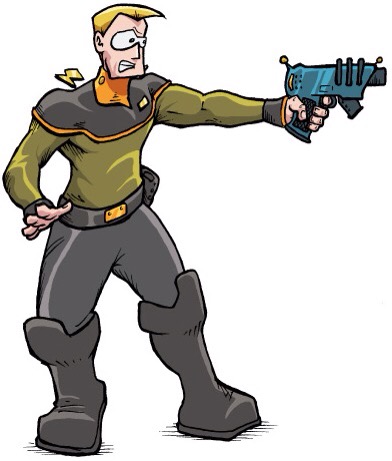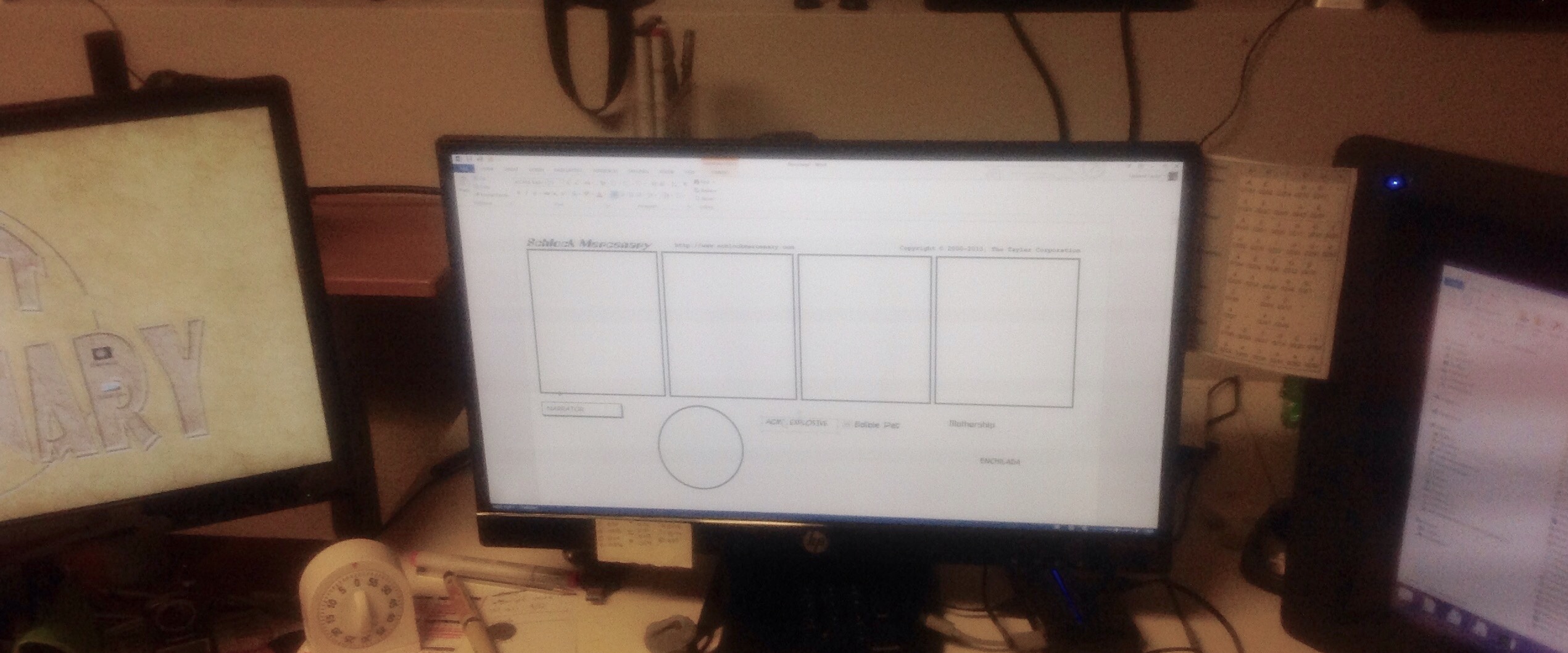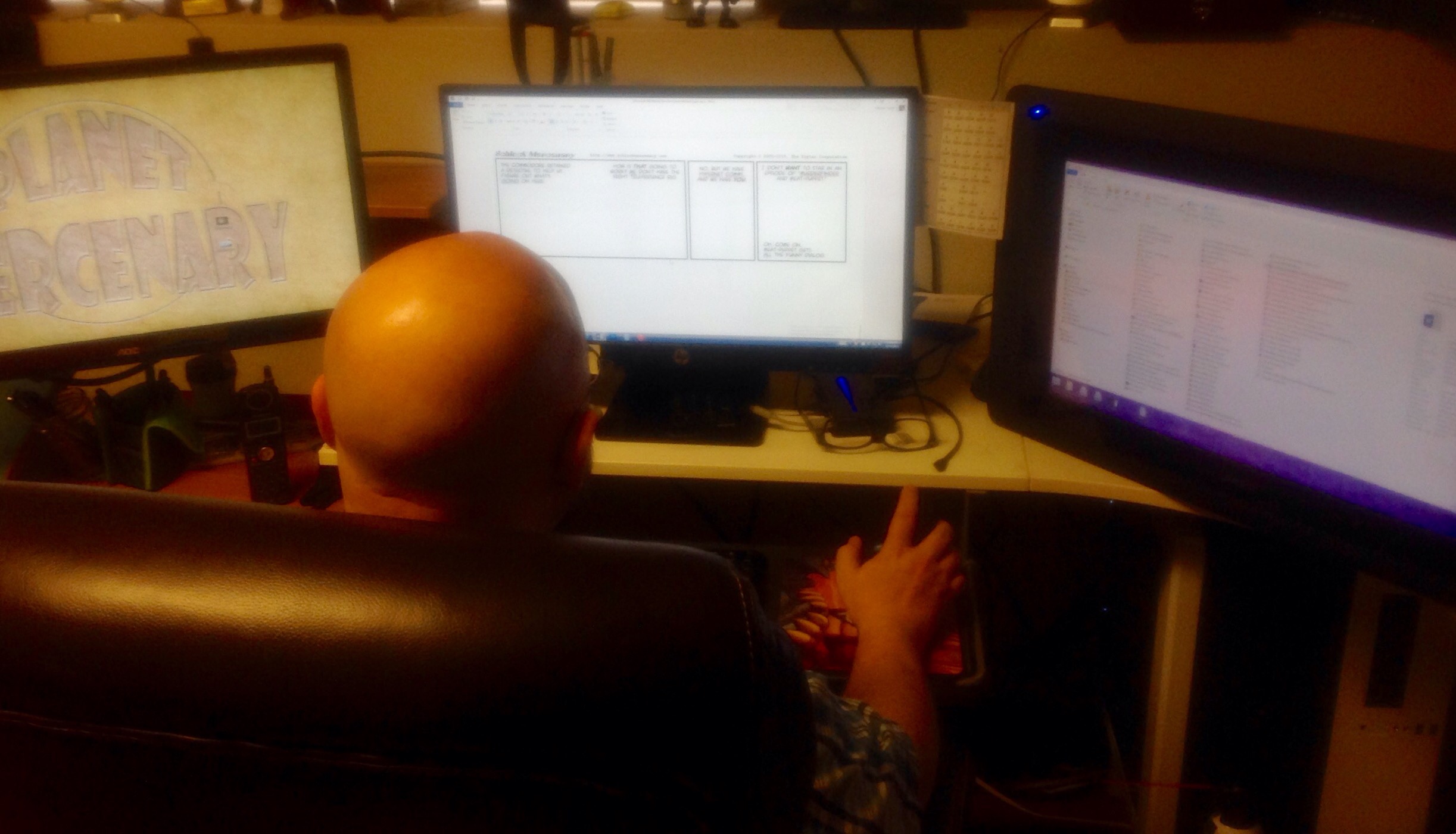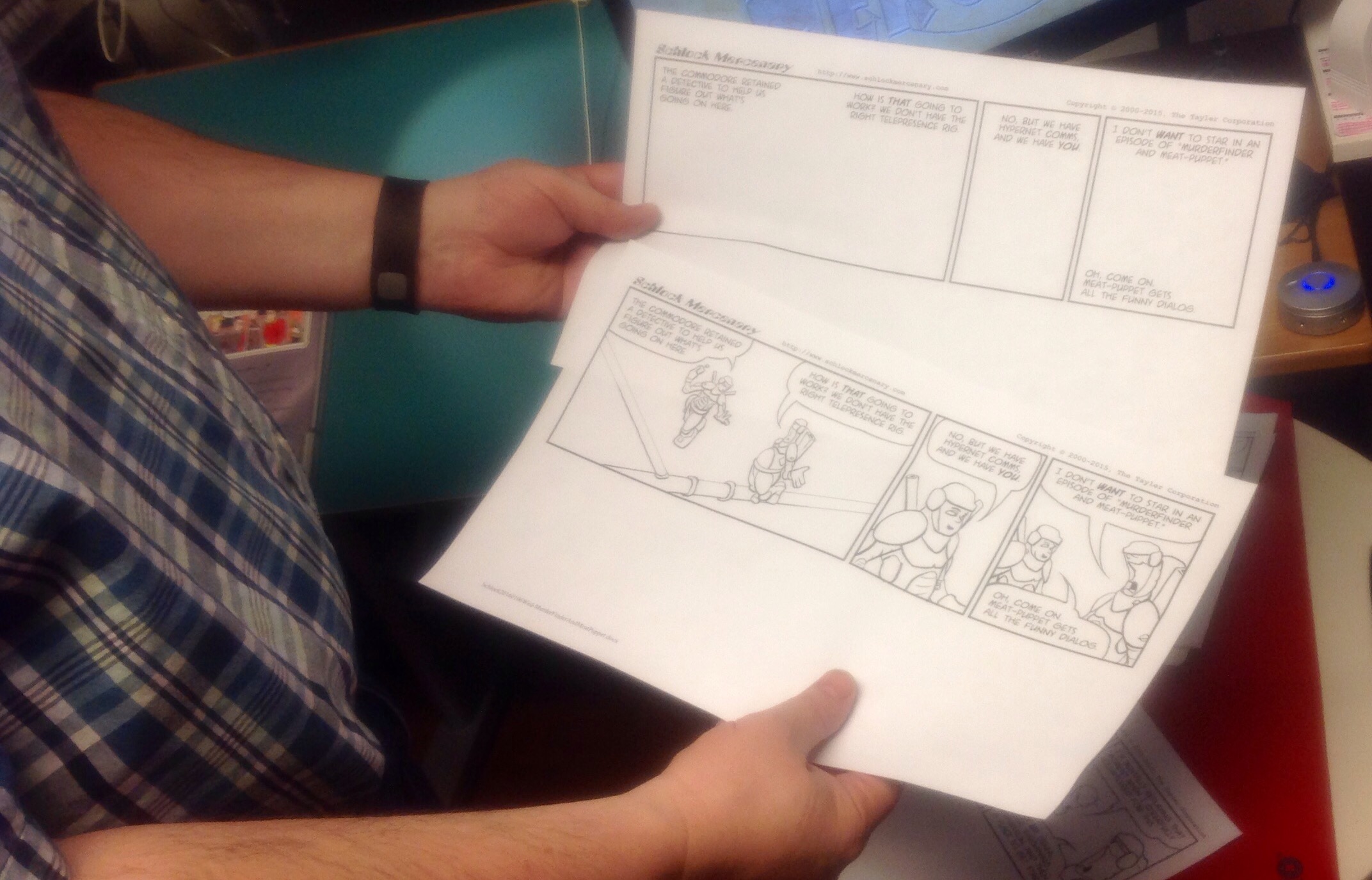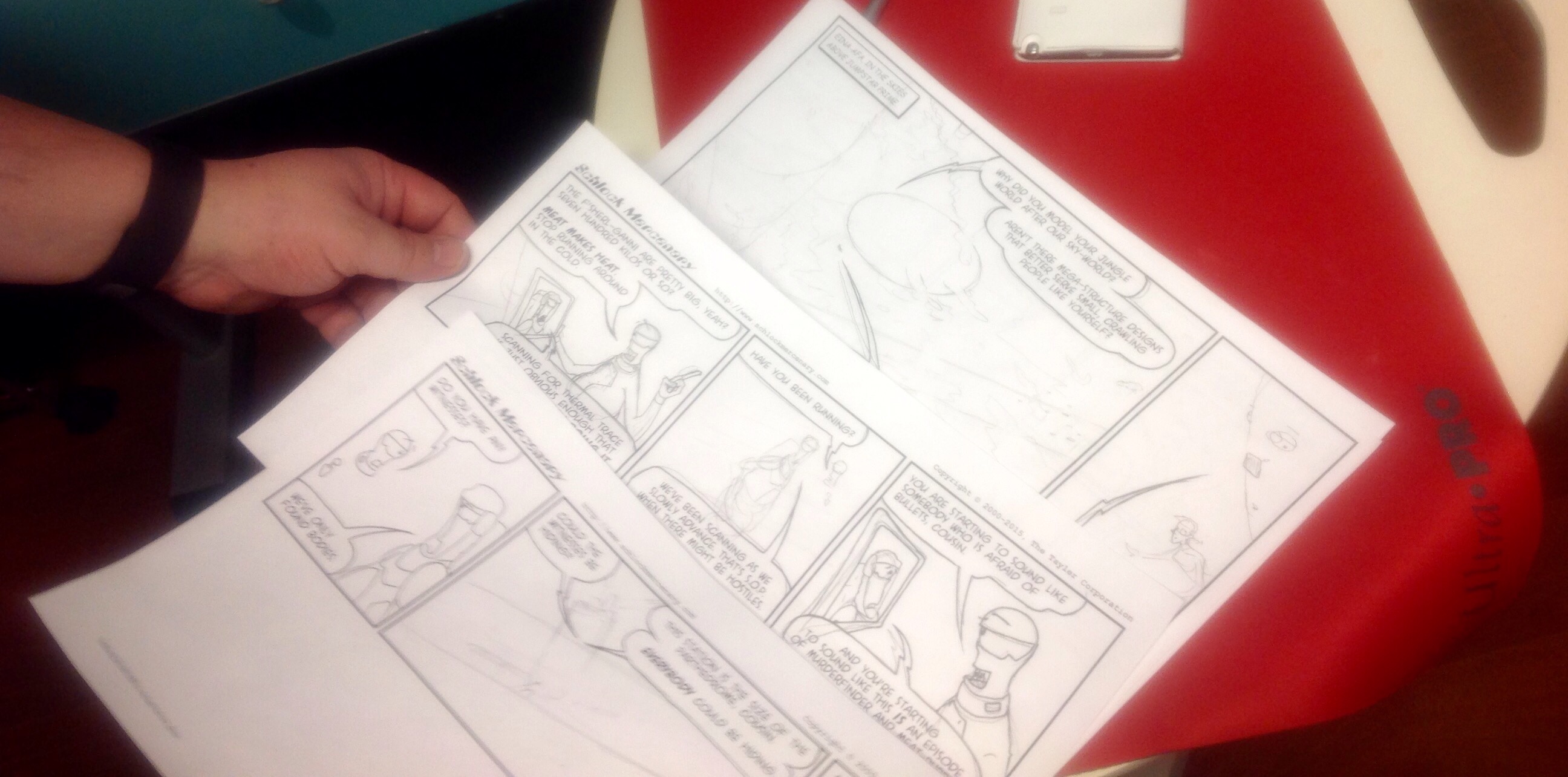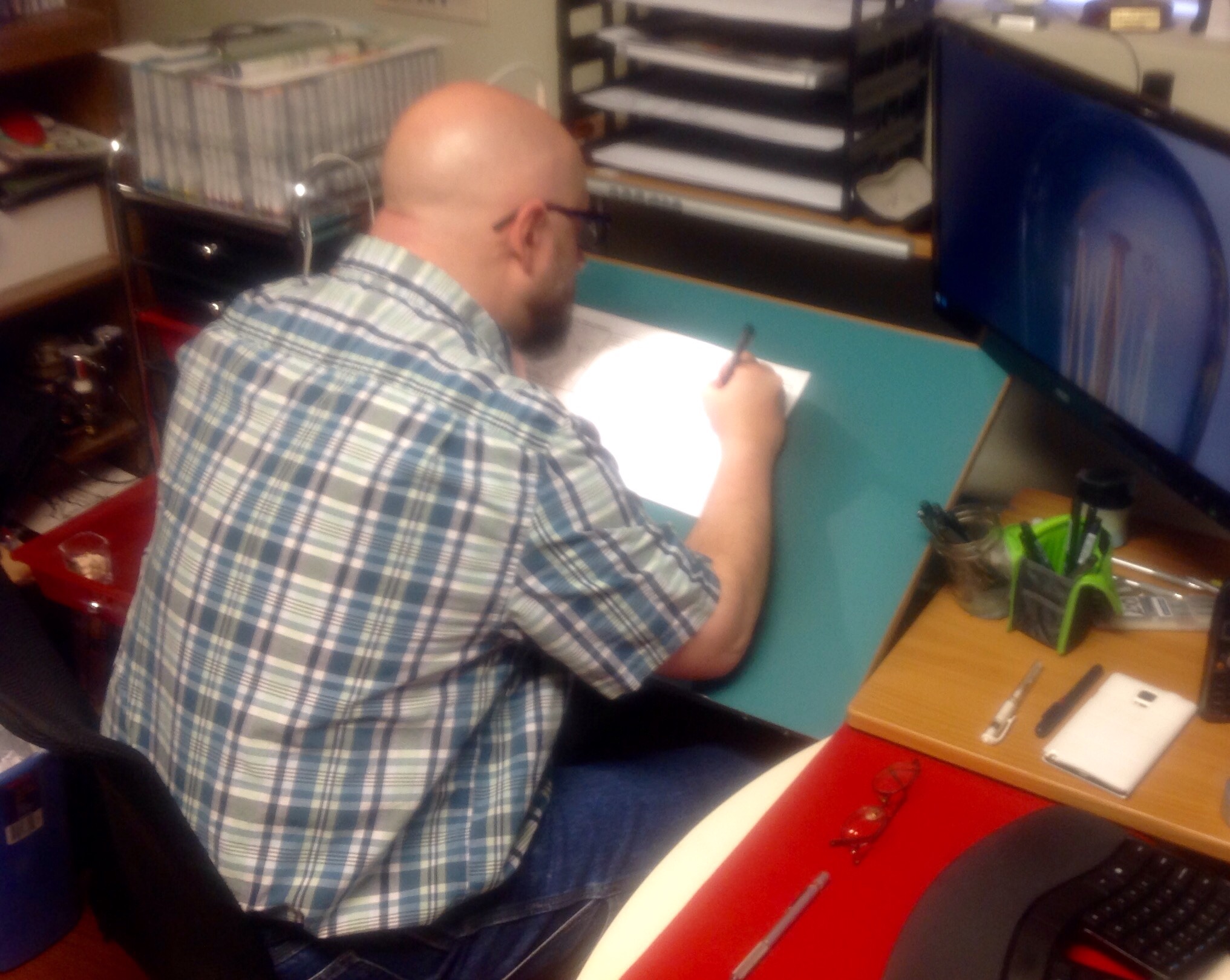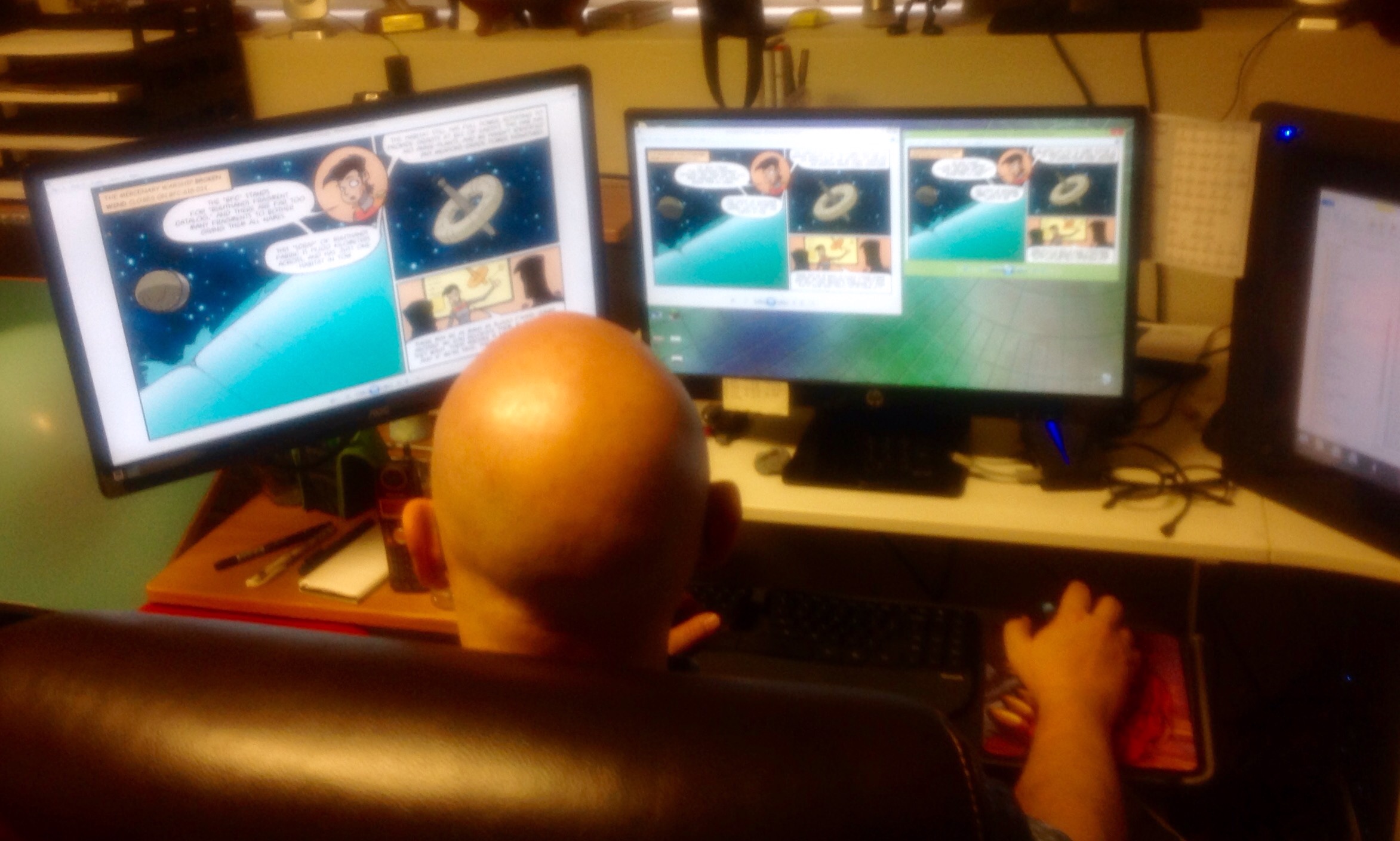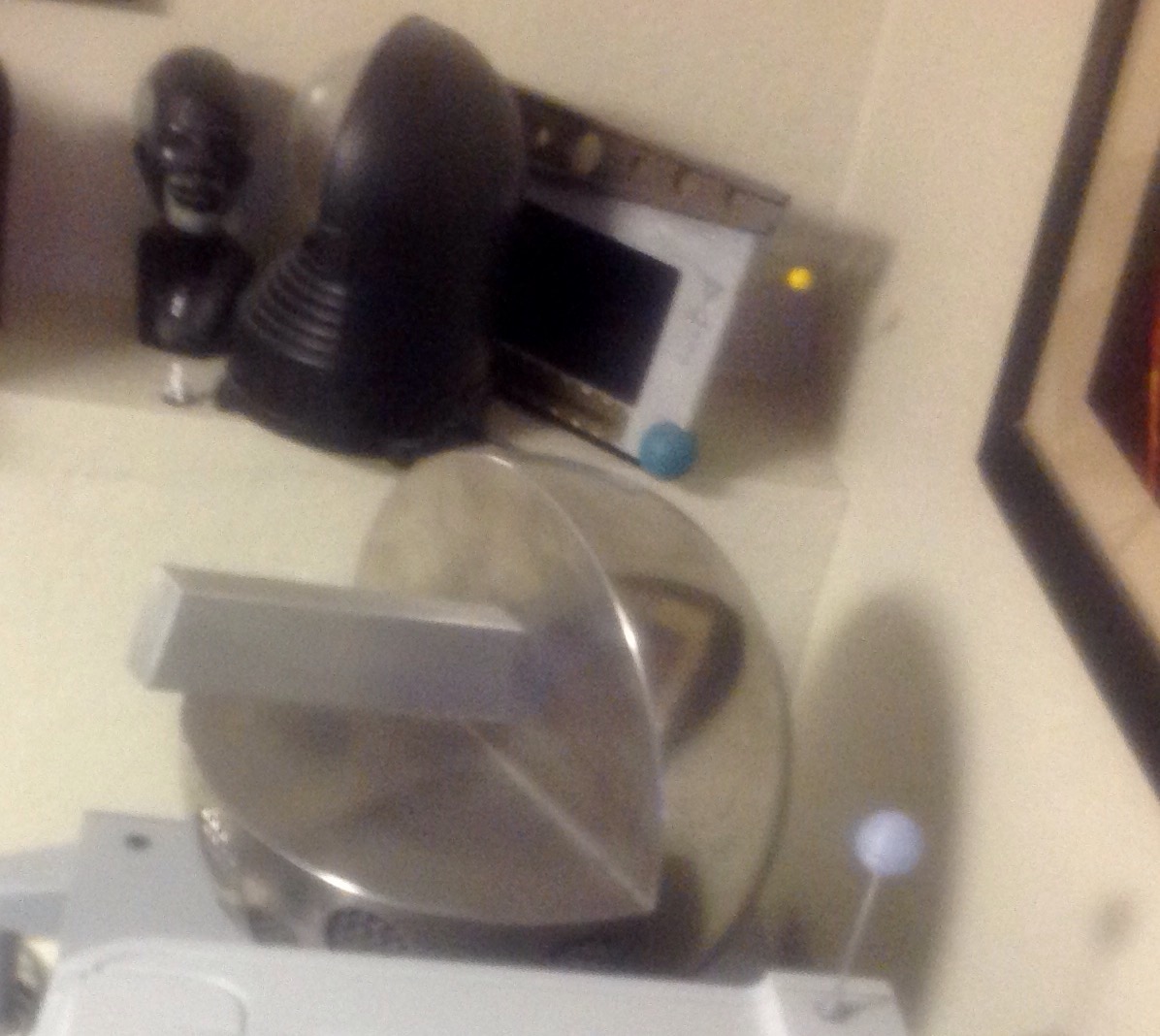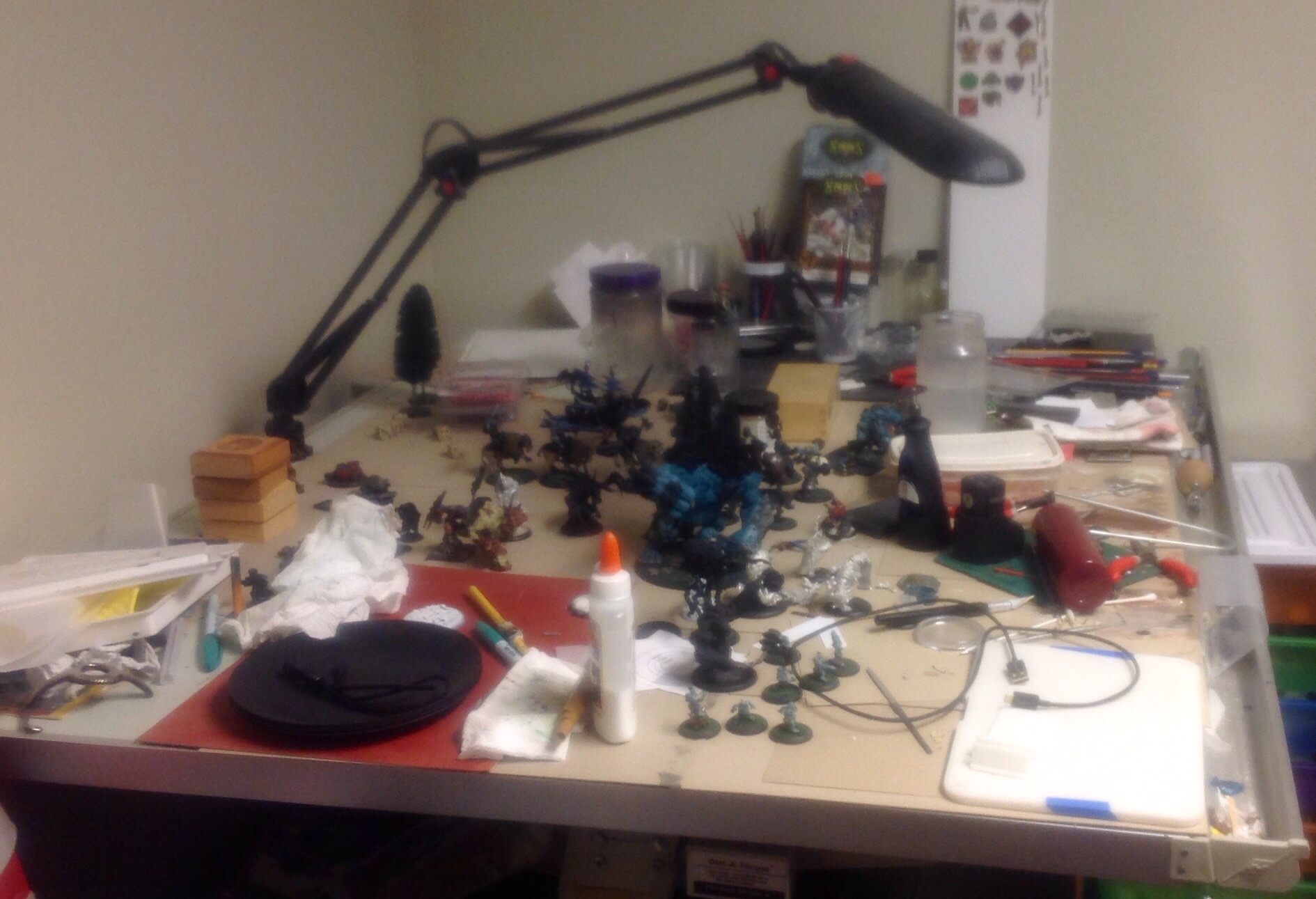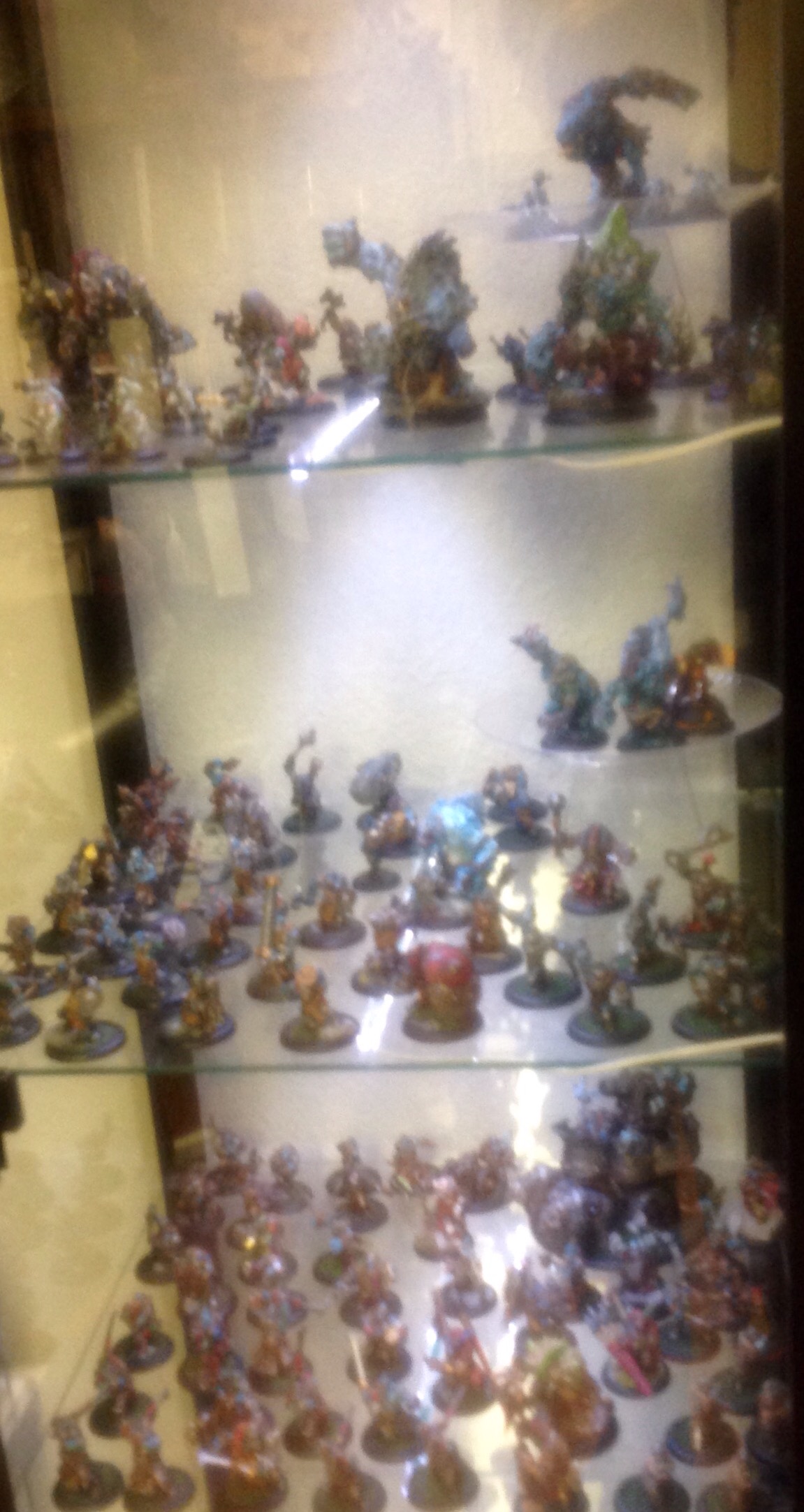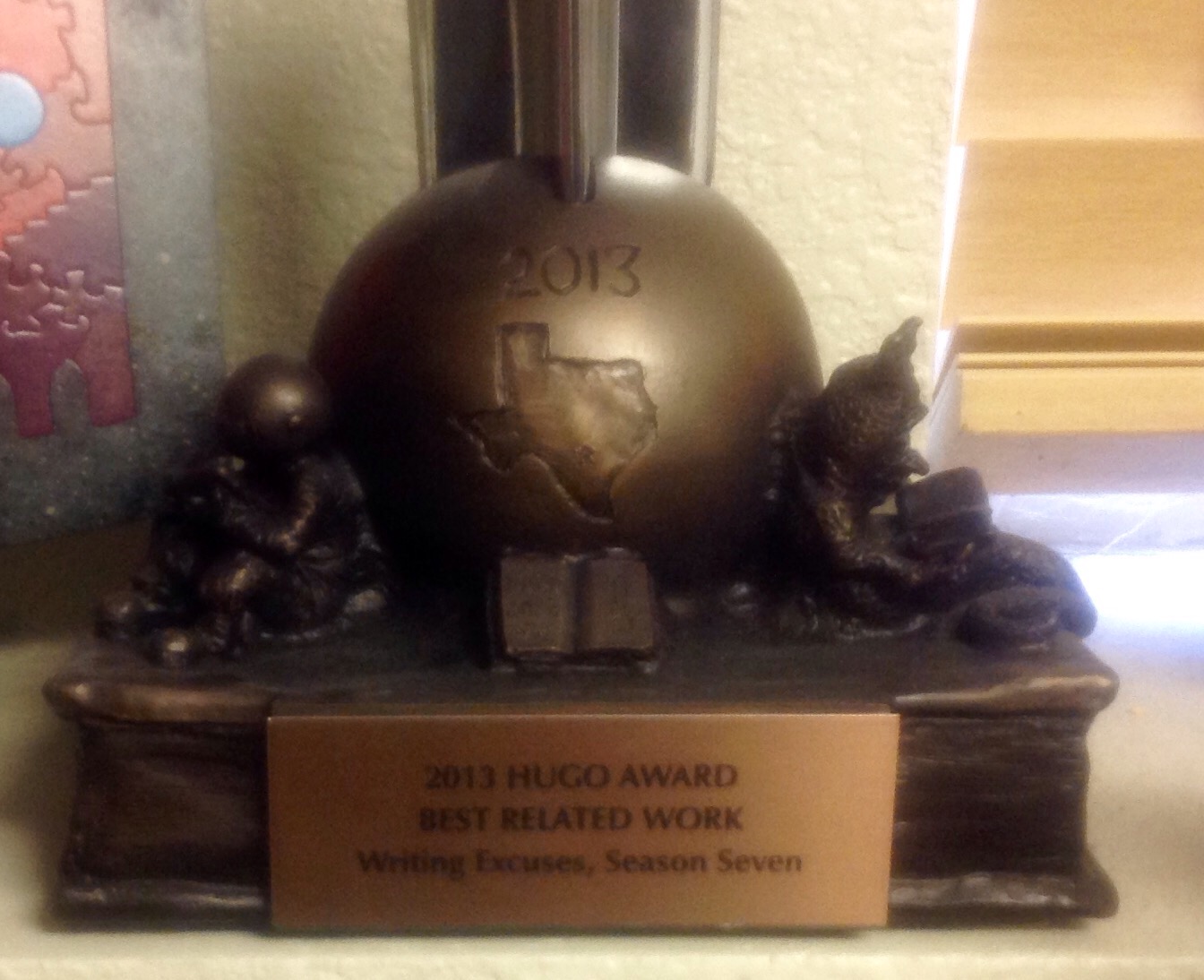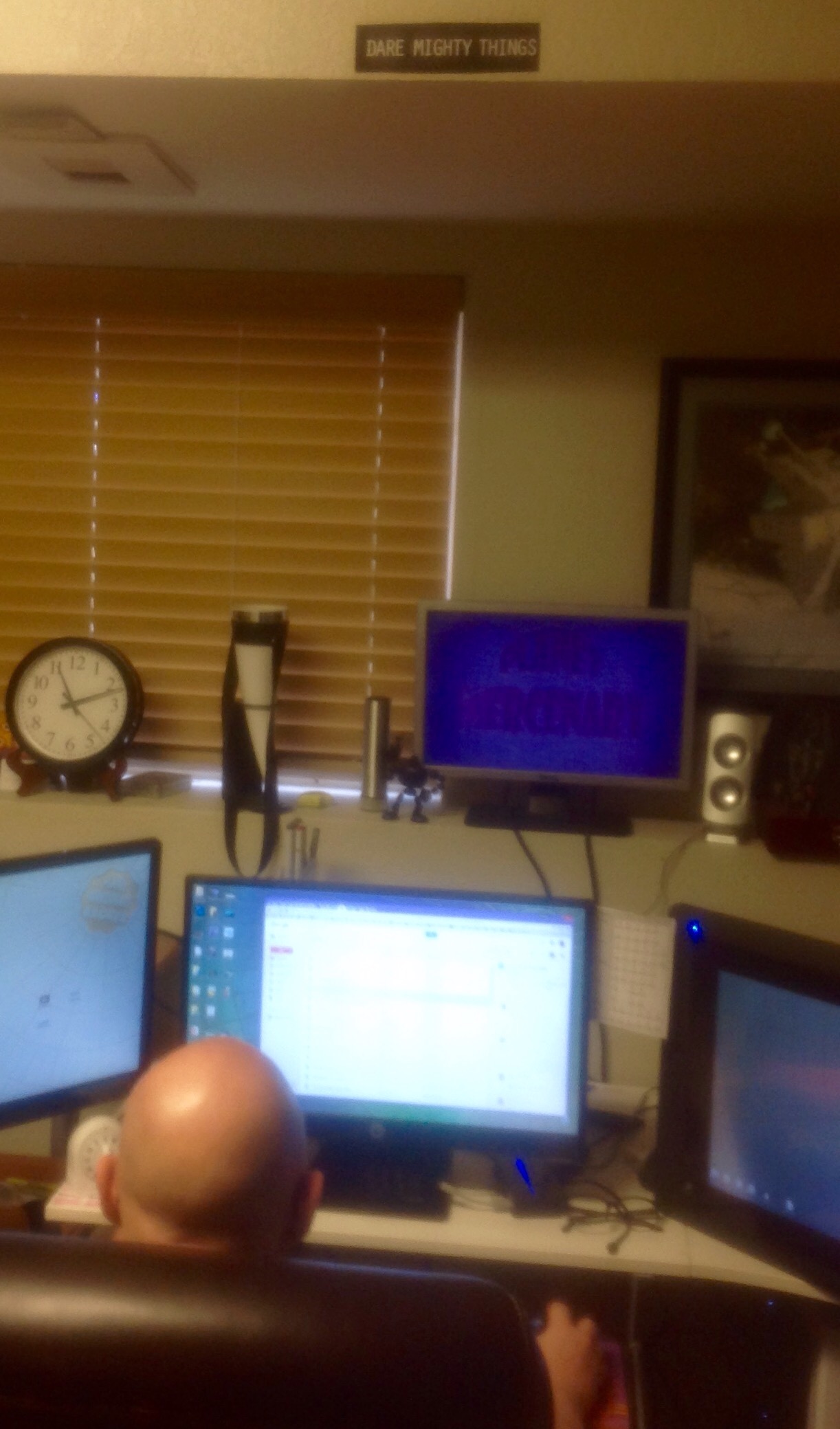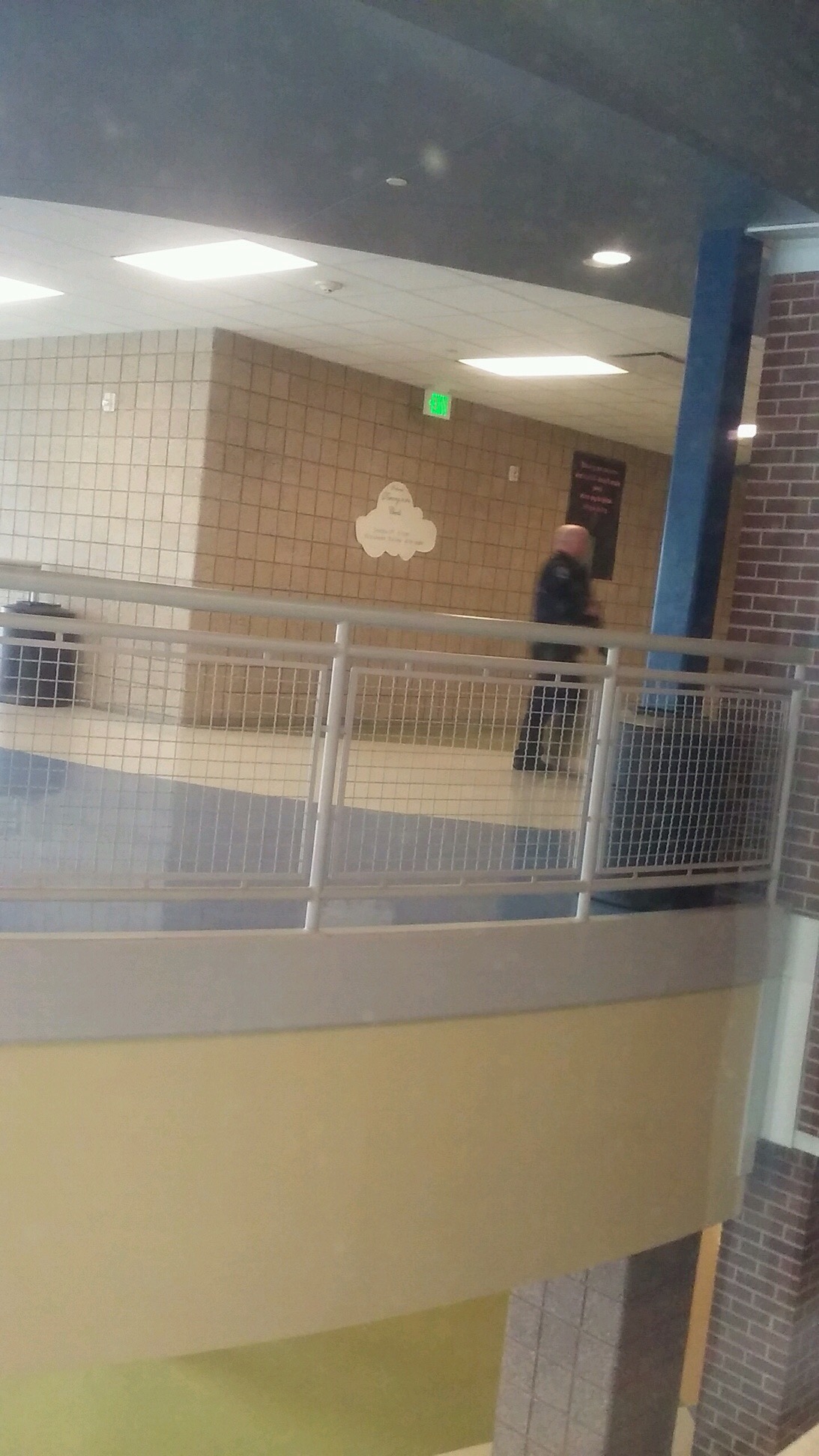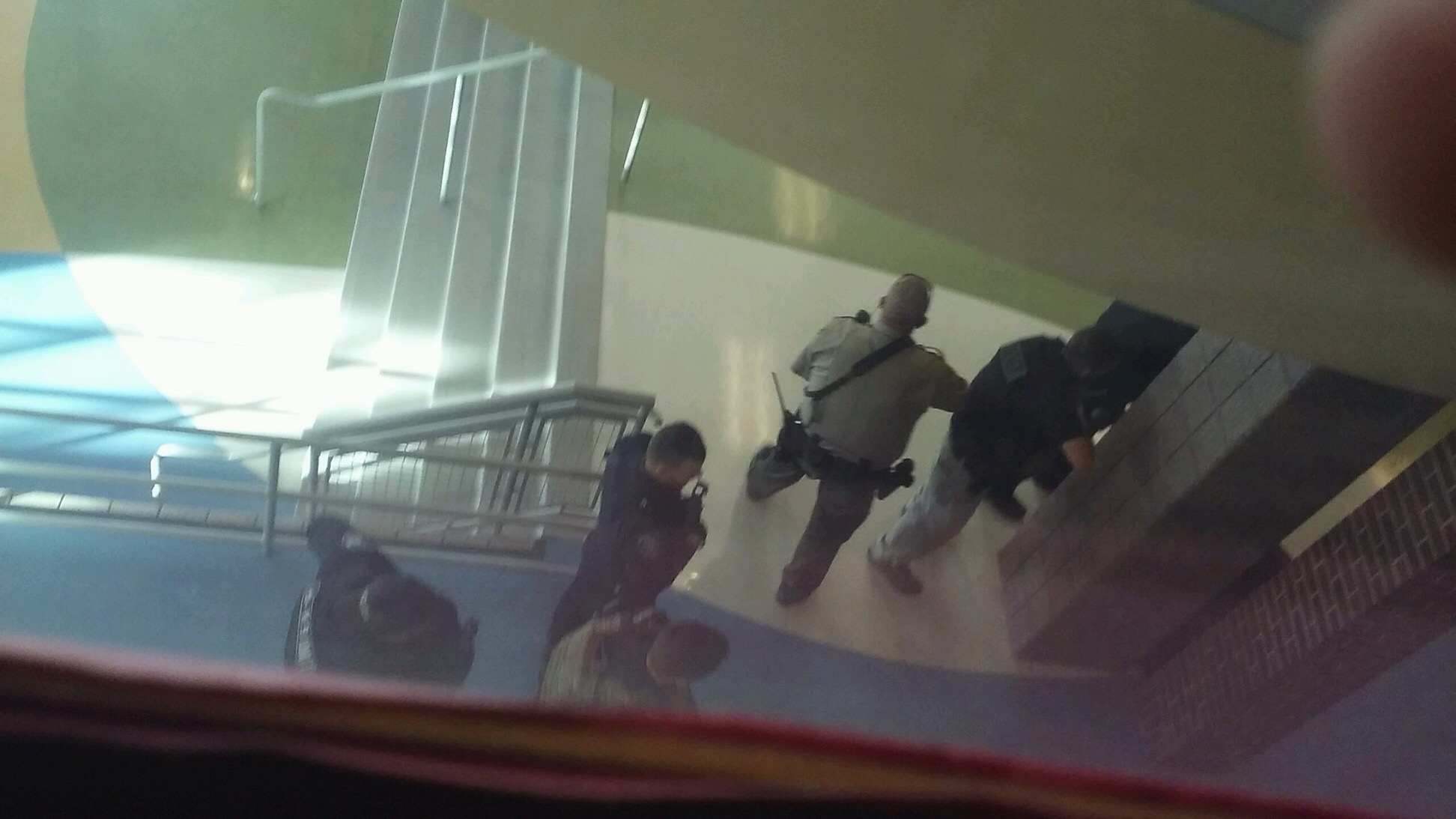I recently solicited questions from the Schlock Mercenary faithful. I asked them what they would like to ask Howard Tayler. They didn’t disappoint. They asked about the past, present and future of Schlock Mercenary. Below are his answers.
[Mark Hedberg] Can you tell us about the time you realized ‘Hey, Schlock is actually feeding my family successfully!’ How did you know, and what did it feel like?
[Howard Tayler]: We knew because math, and it felt like relief.
Specifically, it was 18 hours after we opened pre-orders on the 1st print project, which was Schlock Mercenary: Under New Management. Eighteen hours after pre-orders opened we had paid for the print run AND paid the next six months of bills.
Up until that point we’d been scraping by month-to-month, miracle-to-miracle, barely making ends meet. After that point we had a source of income that involved less scraping, and the ability to plan ahead.
[Will] How much research do you have to do for Schlock Mercenary these days, in particular to maintain consistency with 15 years of previous strips and getting the physics reasonably accurate (e.g. Oisri’s mass and gravity, or antimatter containment in carbon buckyballs)?
[HT] I devote between 2 and 10 hours per week to research. If it’s only 2 hours, it’s the as-needed stuff where I have to scramble to look things up, whether in the archives or in science sources. If it’s 10 hours, I had the luxury of drilling down on something well in advance of writing any scripts.
By way of example, the strip for Feb 1, 2015 required three hours of research for historical data and supporting images that would allow me to create a narrative around the word “cavalry.”
[Erik Zolan] When are you going to start working in other mediums? (Movie, TV series)
[HT] I’m not pursuing that kind of work. It’s time-consuming and expensive, and I’m certainly not going to attempt to finance cinematic or small-screen stuff on my own.
If somebody comes along and offers me a producer’s slice of the pie for some TV or movie story work, well, I’ll put a stake in the ground and say as of that moment I’ll start working in TV or movies.
[Jean Paul] What is the craziest thing you’ve done in the comic since you began to write it?
[HT] Launching an in-media res story (Sharp End of the Stick) with a half-page outline. Things turned out okay, lucky me.
[Mark Hedberg] On the lighter side, which is your favorite character? 😉
[HT] It varies. When a character has an arc that is tied to the larger plot, and when that character is having pain of some sort, and is forced to face it in ways that allow me to write a really good strip? As of that moment, that character is my favorite. Recent favorites include Captain Landon, Captain Sorlie, Libretti/Kowalski, Schlock, and Commodore Tagon.
[Nick Brown] At what point did Schlock Mercenary go from a collection of world ideas and characters to a consistent overarching story with a coherent universe of rules and an overarching plot, or has it pretty much always been like that?
[HT] The universe began hardening up before I was aware of it. By the first story in The Teraport Wars, which was “Quest for Second Sight,” I was actually aware of it, and started planning further ahead. Part of the planning ahead involved looking at what I’d already done, and creating plans for which that stuff would look like carefully laid groundwork.
[alexander] In the (increasingly more miniscule amounts of) free time that you can scrape together, what fiction do you prefer to be a consumer of? Do you have a bookmark folder full of other comics you read (perhaps justifying it as market research), do you veg out in front of favorite tv shows (which?), or do you have a long watchlist of movies?
[HT] Well, the movies I review should serve as a good gauge of what kinds of stories I like. In books, I’m moving away from the re-hashes of the space operas I grew up on. They seem pretty narrow to me these days. For the most part, I read books on recommendations of fellow creators who like to read books.
[Liam] Assuming that Schlock Mercenary will come to an end (say it isn’t so!), how much headspace have you dedicated to your next great epic? Is it something that you find yourself actively thinking about, or is it recognised and put entirely on the back burner for now?
[HT] It is so.
Absent a quantitative metric for “headspace,” I’ll just say “lots.” I have lots of kilobytes worth of notes, and lots of different kinds of notes for lots of different types of stories. Lots and lots and lots.
The “back burner” metaphor is apt here, because as someone who cooks a lot, I know that during a single session at the stove, things will get moved between burners at least two or three times. The stuff on my back burner gets pulled to the front every so often.
[Paul] Are there any ways in which your personal faith or beliefs influence your writings (whether thematically, what content you are willing or not willing to include in the comic, etc)?
[HT] This is a tough one to answer. It’s a little bit like asking a fish to explain how water has affected his choices about where to live. The unrecognized influences far outnumber the ones I can put my finger on.
The biggest influence on my work is that I wanted to tell a story that was the kind of story I like to read.
If I had to pick a single religious principle whose expression has been important to the Schlock Mercenary story, that principle would be “agency,” as understood by my fellow Mormons. Our choices, right or wrong, are OUR choices, and our claim on them is sacred. I suspect that the astute reader can find that particular thread woven throughout the comic.
[Keith Schiffner] How come we never see any left handed charectors? Hmm?” (from a concerned lefty who is so left handed I could lose the right arm and not miss it.)
[HT] Kaff Tagon is left-hand dominant. Any character who is firing their weapon in plot-advancing, “protagonist-supporting” ways in the last panel of a strip is likely to be firing it left handed, because that lets me draw the more interesting, “open” side of their body, rather than having their right arm screen most of them.
Honestly, I don’t give character handedness that much thought. I’m cross-dominant, and have trained myself for ambidexterity in a few ways. I decided that well-trained soldiers of the 31st century will similarly train themselves in order to ensure maximum effectiveness. If the passage curves up and to the right, a right-handed weapon may present a slight disadvantage.
[BenE] Given your introduction of aliens and intellects of carbosilicate amorphs, dark matter, advanced networked AI’s, gas inflated foil etchings, regenerated lives, time clones, duplicated clones with identical memories and more, what do you think would be the first of all those creations of yours for humankind to be likely to encounter or create?
[HT] Artificial Intelligence.
I think all of the necessary technologies already exist. We simply haven’t had time to go correctly combinatorial on ’em.I think we’ll hit A.I. before we hit indefinite human life extension, and the modes we use for extending our lives will depend heavily upon HOW we hit A.I.
This is the fourth of a five part series on Schlock Mercenary.
Monday – Interview with cartoonist Howard Tayler
Tuesday – Interview with Business Manager Sandra Tayler
Wednesday – A Day in the Life photo essay of the cartoonist process
Thursday – Howard Tayler answers pre-submitted Fan Questions
Friday – New Maxims Revealed
Rodney M Bliss is an author, columnist and IT Consultant. His blog updates every weekday at 7:00 AM Mountain Time. He lives in Pleasant Grove, UT with his lovely wife, thirteen children and grandchildren.
Follow him on
Twitter (@rodneymbliss)
Facebook (www.facebook.com/rbliss)
LinkedIn (www.LinkedIn.com/in/rbliss)
or email him at rbliss at msn dot com(c) 2015 Rodney M Bliss, all rights reserved
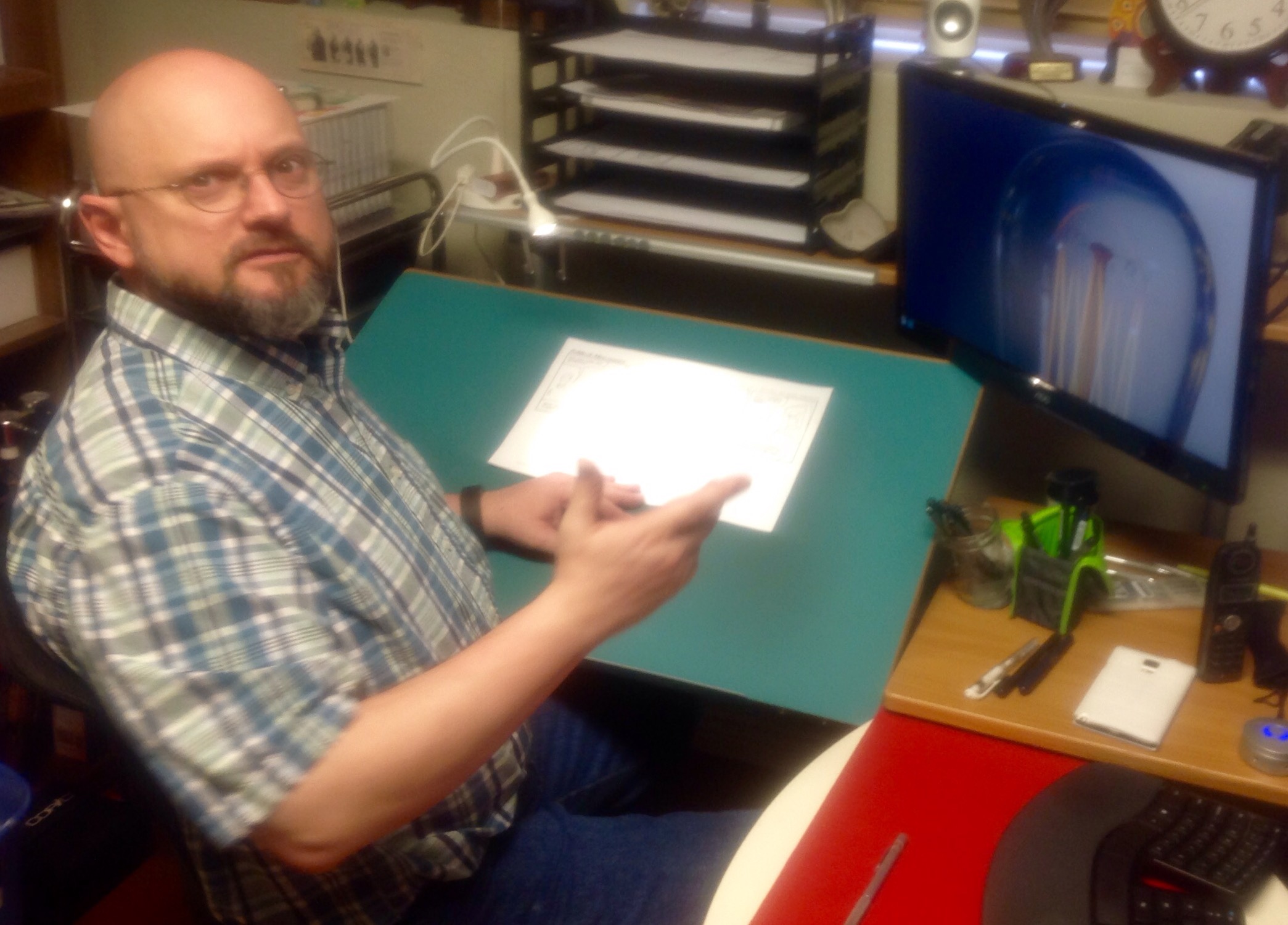
I can’t go straight from writing a script to drawing the pictures. The scripts have to bake first.
How long does that take?
It depends. On a script that I know right out away is good, maybe half a day. Typically it’s about 24 hours.
Howard Tayler is living his dream. His company, Tayler Corporation is planning to release a roleplaying game next year called Planet Mercenary RPG. He is part of an award winning podcasting group called “Writing Excuses.” If you visit his website at www.howardtayler.com you can read his yearly movie rankings (The Martian is currently his favorite of the year) along with reviews. You can also follow a link to buy his books, coins, t-shirts, mugs and a host of other branded merchandise. But, the engine that drives his company is the web comic at www.schlockmercenary.com.
He’s been drawing and publishing his comic since June 12, 2000. (5,665 days without an interruption.) He used to have to balance his drawing with the demands of a full time job in the computer industry. But, since September 21st, 2004 he’s been a cartoonist full time. And he describes it as the best job in the world.
I had the opportunity to spend a couple of hours hanging out at Howard’s home office and he explained the process of creating a Schlock mercenary strip.
The first step is writing. I didn’t show a picture of the writing process. It’s not very picture friendly. Howard writes the dialogue first. He typically can write a week’s worth of dialogue in a day. He has to allow the bake time as mentioned above. Many entertainers are at heart, writers.
I used to think I was a comic who wrote his own material. Later, I realized I was a writer who delivered his material on stage.
– Comedian George Carlin
Every strip begins with a basic template From here, Howard arranges the panels and plots the physical layout of the day’s strip.
After deciding on the physical layout, he adds the now baked script to the blank panels.
The pages with dialogue but no pictures are then printed out on legal sized (11×14 inch) paper. Here he is showing a before and after. But, there are still a couple of steps to get from the words sheet to the picture one.
Pictures are first drawn in pencil. This step is, not surprisingly called “penciling.” Many people might consider this the “real” part of creating the comic. It’s where the visual images transfer from Howard’s head to paper. Pencils are still temporary.
After the penciling it’s time to “lay down some ink.” Howard explained that he normally will put on a NetFlix video during the inking. The creative parts are finished by this point. It’s simply a matter of making the images permanent.
Penciling and inking a week’s worth of comics takes about two days.
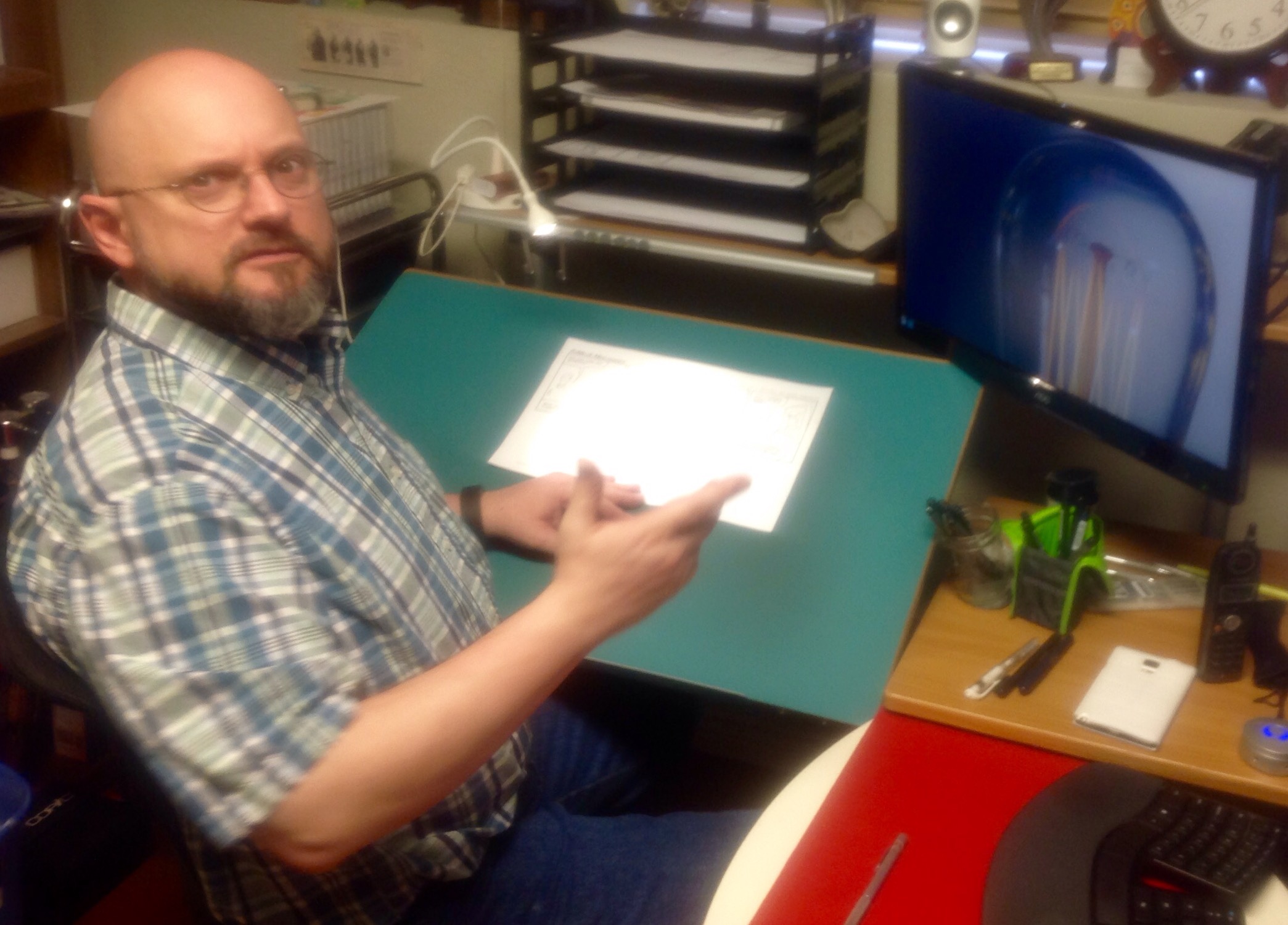 I remember several years ago, visiting Howard when he drew at Dragon’s Keep, a game store in Provo, Ut. He was inking some strips. Or, I should say he was attempting to. It quickly became obvious that I was distracting him. I excused myself and he got back to work uninterrupted. During our recent interview he inked seemingly effortlessly while we talked. Either he’s gotten a lot better at inking or I’m a lot less distracting. We should move on.
I remember several years ago, visiting Howard when he drew at Dragon’s Keep, a game store in Provo, Ut. He was inking some strips. Or, I should say he was attempting to. It quickly became obvious that I was distracting him. I excused myself and he got back to work uninterrupted. During our recent interview he inked seemingly effortlessly while we talked. Either he’s gotten a lot better at inking or I’m a lot less distracting. We should move on.
I didn’t get a picture of the bottle of White Out, but that is an essential tool in the artist’s tool chest. Once he’s satisfied with the inking, it’s time for the coloring. Howard scans the completed strip and sends it to Travis Walton, the Schlock colorist.
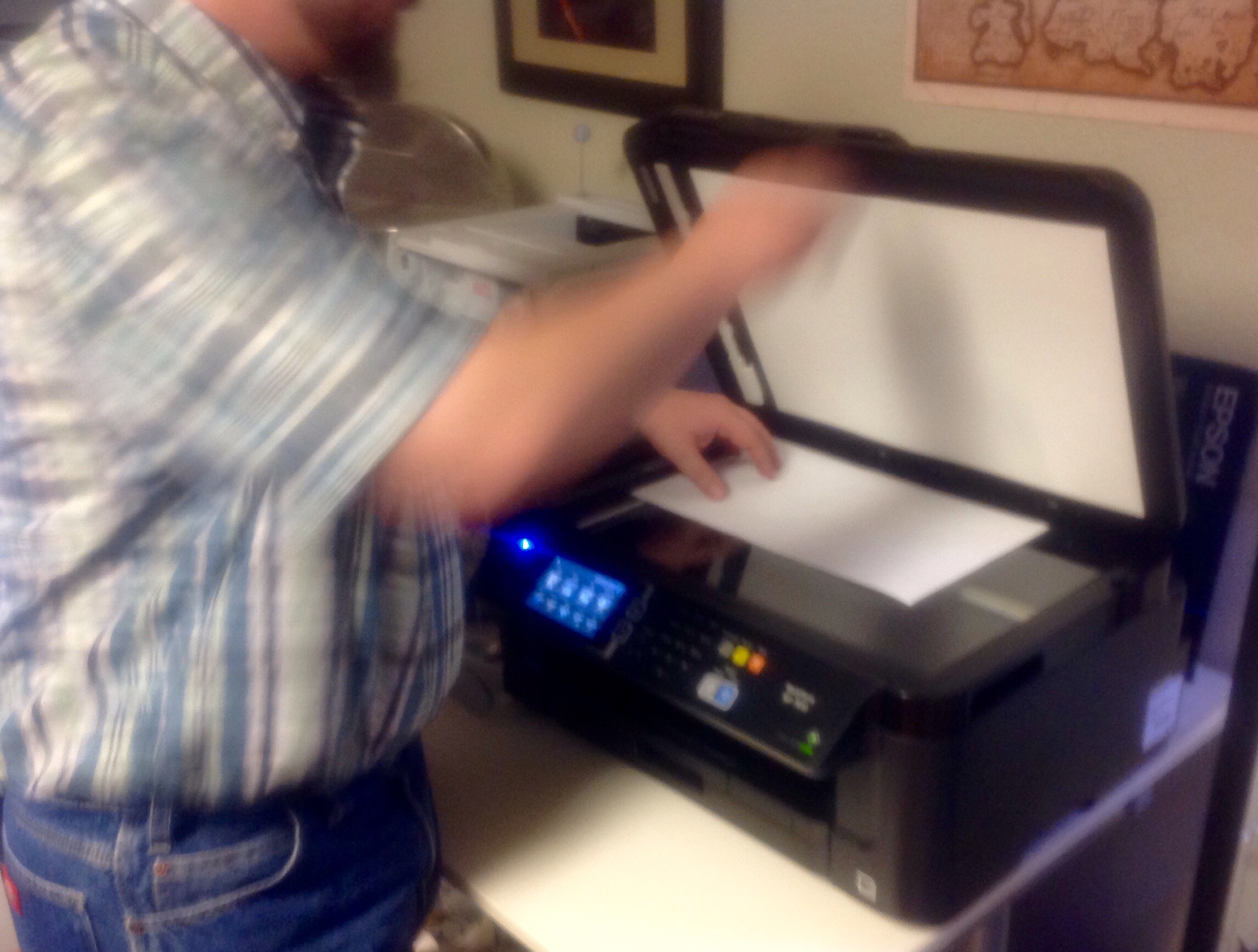 Interestingly at this point the hard copy pages, the pulp of dead trees that he drew on, are no longer necessary to the process. Howard has been known to sell them. I have these original pages from the Mega Shark story framed and hanging in my office.
Interestingly at this point the hard copy pages, the pulp of dead trees that he drew on, are no longer necessary to the process. Howard has been known to sell them. I have these original pages from the Mega Shark story framed and hanging in my office.
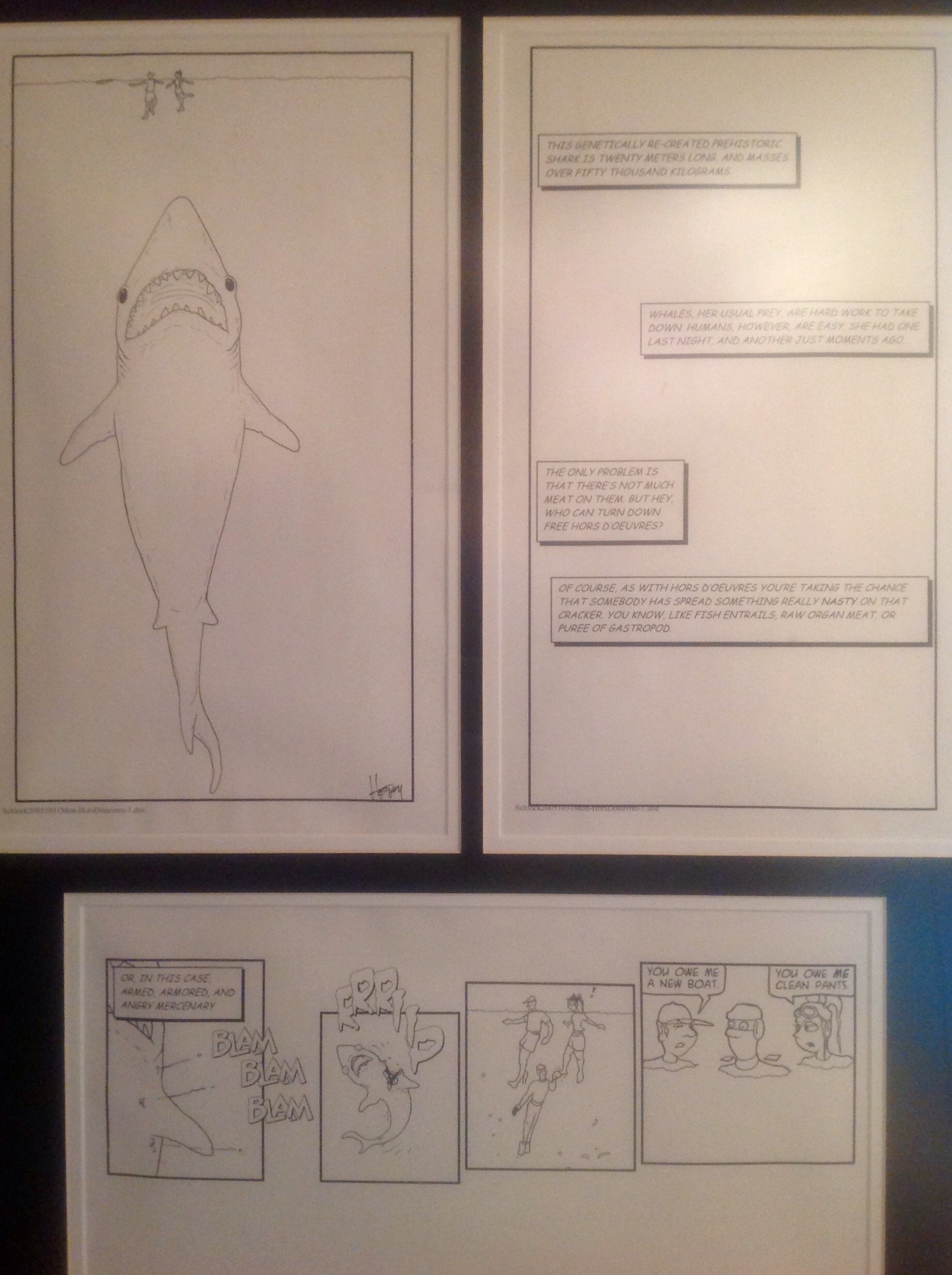
Howard later released it as a poster. The framed inks and the poster hang side-by-side in my office.
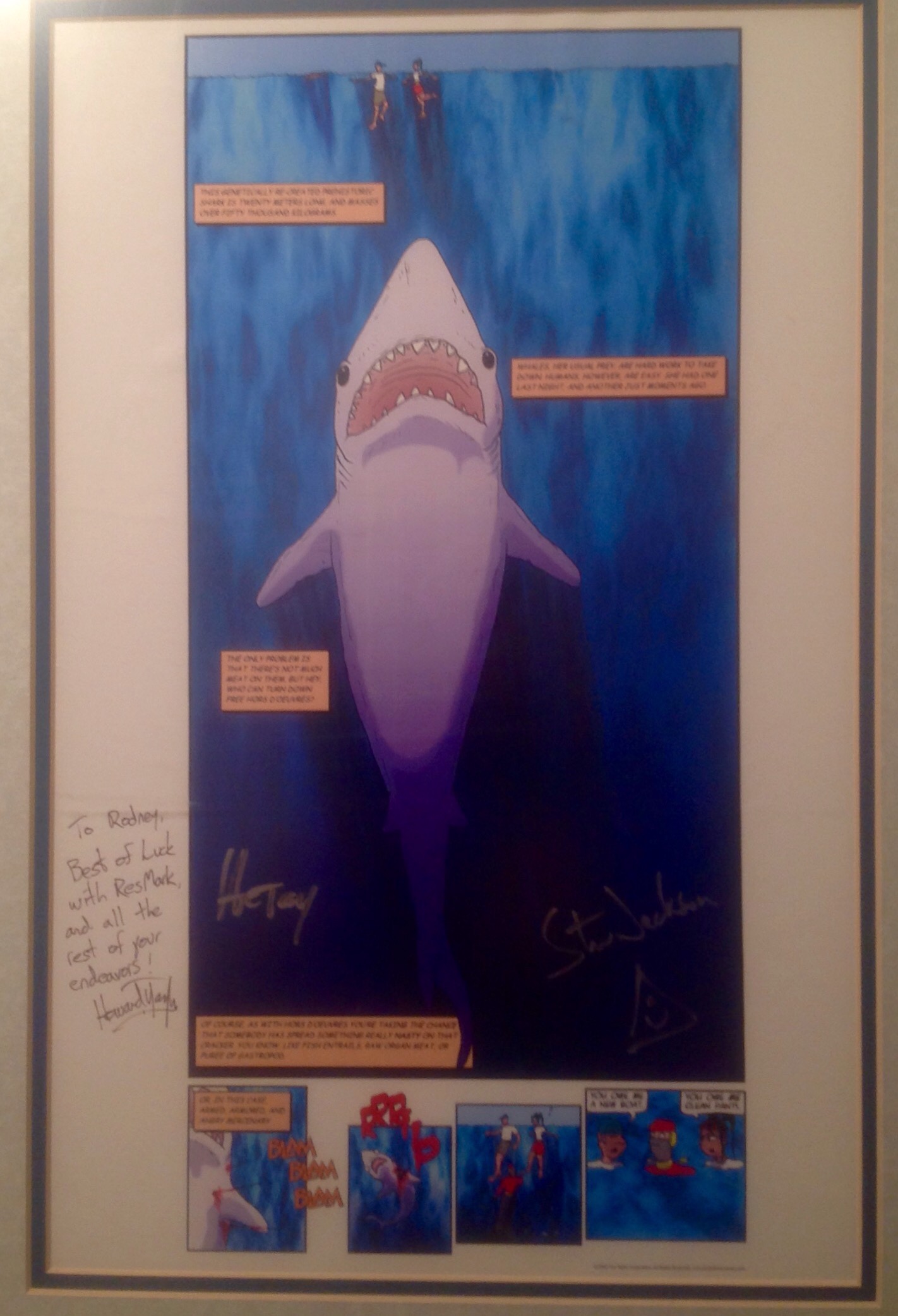 After Travis completes the coloring, Howard creates three version of each image, visible here on his monitors. There’s a Retina version, for iPads, an iPhone version, and the “grid” or web version. Much of the process is automated as each file is saved in its correct format and file type with a unique name, into a specific directory. At the appropriate time the files are pushed to the various platforms for Schlock fans to enjoy.
After Travis completes the coloring, Howard creates three version of each image, visible here on his monitors. There’s a Retina version, for iPads, an iPhone version, and the “grid” or web version. Much of the process is automated as each file is saved in its correct format and file type with a unique name, into a specific directory. At the appropriate time the files are pushed to the various platforms for Schlock fans to enjoy.
It’s a very complex process that is made to look very easy by a man who’s been doing it for 15 years.
What would a tour be without showing you some of the interesting collectibles that he’s gathered over the years? Howard’s office includes several interesting bits and collections. In one corner is the life size plasma cannon.
The walls are covered with framed book covers. 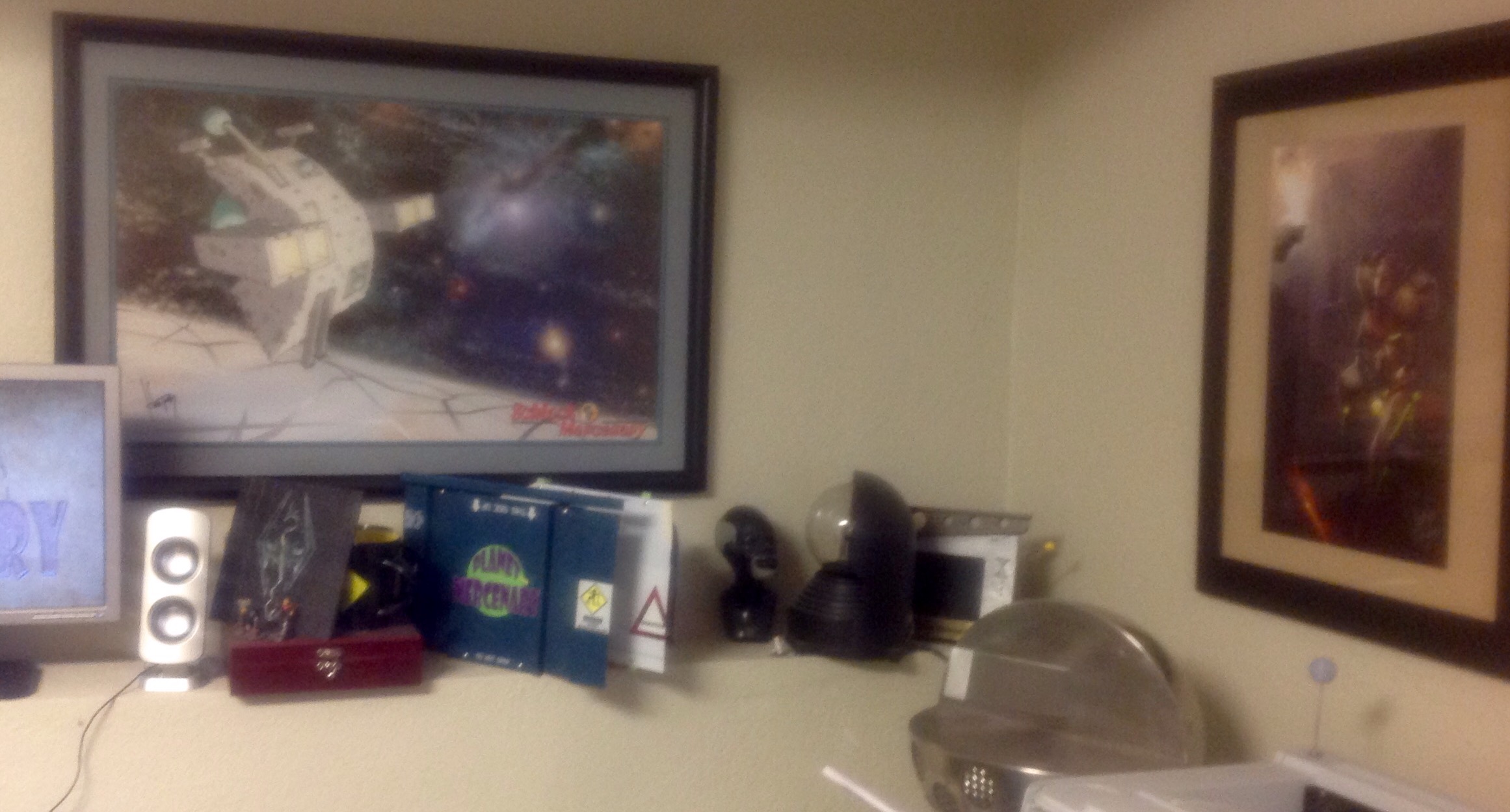
A table and two class cabinets are dedicated to miniatures.
I meant to ask you about miniatures. I wasn’t sure if you were still painting them. You haven’t mentioned them recently online.
The Planet Mercenary work has taken the time that painting miniatures used to fill.
Doesn’t that mean replacing a hobby with a work task?
Not really. But, even if it did, the PM stuff has an end date. I would love to have time to paint miniatures. And I’ll gladly return to it when the game is done.
And of course, the Hugo award that he won for Season Seven of Writing Excuses has a prominent place.
I didn’t notice the sign above his desk until I was just about to leave. I think it’s clear that Howard has taken the advice “Dare Mighty Things” to heart.
This is the third of a five part series on Schlock Mercenary.
Monday – Interview with cartoonist Howard Tayler
Tuesday – Interview with Business Manager Sandra Tayler
Wednesday – A Day in the Life photo essay of the cartoonist process
Thursday – Howard Tayler answers pre-submitted Fan Questions
Friday – New Maxims Revealed
Rodney M Bliss is an author, columnist and IT Consultant. His blog updates every weekday at 7:00 AM Mountain Time. He lives in Pleasant Grove, UT with his lovely wife, thirteen children and grandchildren.
Follow him on
Twitter (@rodneymbliss)
Facebook (www.facebook.com/rbliss)
LinkedIn (www.LinkedIn.com/in/rbliss)
or email him at rbliss at msn dot com(c) 2015 Rodney M Bliss, all rights reserved
Her name doesn’t appear on the cover of Schlock Mercenary books. She’s in the acknowledgements. But Sandra Tayler is critical to the success of Schlock Mercenary (written and drawn by her very talented husband Howard Tayler.) In addition to wife, mother, proofreader and sounding board for Howard, Sandra fills the often less glamorous role of Business Manager. It’s not uncommon to hear Howard respond to a question with “That’s a Sandra thing. I have no idea.”
Sandra is also an author, writing a blog called “One Cobble At A Time,” as well as children’s storybooks. I conducted an email interview with her last month where she explained some of the challenges that accompany running a small business.
[Rodney M Bliss] Some couple don’t work well together. I’m not sure that I could be partners in business with my wife. How do you guys make it work? Has it been harder or easier than you thought it would be?
[Sandra Tayler] In some ways this is like asking a fish to describe water. What we do is the only way I know how to be married. At this point the business partnership and the marriage partnership are so intertwined that I’m not really able to identify which parts are which.
I think the first thing that has helped us is to recognize the different roles we play. For example the Art Director (me) has to keep the Artist (Howard) on deadline for projects. The Artist (Howard) will then want to go gripe to his wife (me) about the stress he is feeling. By identifying all the roles we’re able to analyze how they interact and conflict with each other.
The second part is that we’re both very able to self introspect and identify where we are emotionally. That way I can tell Howard that I need him to be Loving Husband instead of Focused Marketing Guy.
The third part is that when we goof up and accidentally be the wrong role, hurt each other, or cause each other stress, we always make sure to re-discuss the incident later. We’ll talk through how our communication went wrong so we don’t make the same mistake again. We’ll never run out of mistakes to make, but the process brings us back together afterward.
[RMB] Did you always want to be a writer? At what point did you think, “I want to write these children’s books and publish blog entries”?
[ST] I began being a writer at the age of six. I still have that story handwritten in pencil. I wrote through high school then went on a decade long hiatus when I was finishing college, having babies, raising toddlers, moving house, and managing some health issues. Right around thirty I needed to rediscover who I was when I was not being Mom. That was when I began my blog on LiveJournal, though I didn’t even learn the word blog until years later. It took me years before I recognized that blogging was a significant writing form with its own value. Before that it was just me tossing my thoughts out into the world and being pleased that others cared to read. I’ve since come to appreciate blogging as a form and I’m pleased to be part of it.
The picture books I wrote in answer to the specific need of one of my children. Most of my short stories are the result of random ideas that I put together and shaped. Often the short stories were written with a specific market in mind. The middle-grade novel that I’m working on takes some themes that are dear to my heart and wraps a story around them which I hope will speak to others. All of my writing is my attempt to wrap ideas in words so that other people can unwrap them and see what they find inside. What they find is not always what I thought I put in there
[RMB] How do you manage to separate work and home? Do you consciously set limits on how much time you will devote to work tasks in a day and sometimes leave stuff undone because it’s time to be with your family?
[ST] These are very good questions and every time I think I’ve got them figured out, the kids change. Then I have to overhaul my system again. Early on I had a “Work when the baby naps” system that worked great until I had two kids. For a while I hired an older child to come play with my young ones while I worked. When the kids all started going to school I would work while they were out of the house and focus on family when they came home. These days I generally try to work while the kids are in school, but one is partially homeschooled, so sometimes he needs attention mid-day. Also we’ve been managing quite a lot of medical appointments and meetings with school staff, most of which fall into the middle of my work day. This means that I’m often working into the afternoon and evening or on Saturdays. All of the things in life are a trade off. I have to look at each day and prioritize. Sometimes the work waits on family, other times family waits on work because work pays for family needs.
[RMB] The Schlock Mercenary order fulfillment process has changed a lot over the years. You no longer have the massive shipping parties that you once had. Was it that you became more efficient at the process, or did you find that too many cooks spoil the soup, and there was a point beyond which more people slowed the process down?
[ST] The massive shipping parties were driven by some very specific conditions during the early years of Schlock Mercenary. Because I had little children in the house, it was not safe or sensible to let shipping take over the whole house for an extended time. This meant we needed an out-of-house location. The one we had available was a local comic shop, Dragon’s Keep, who kindly donated the space. However I was always aware that our stacks of books and people putting things into packages did have an impact on their store operations. I wanted to be in and out as fast as possible. This meant that I printed postage in advance and tried to gather as many volunteers as possible so that we could get everything packaged and out the door in a single day. The events always had a fun energy, but I was always very stressed making sure they were organized and then run.
The first thing that changed was the rules on printing postage. They started putting dates on all the packages. Instead of being able to print weeks in advance, I could only print 3-4 days ahead and I had to make sure that the dates on the packages matched the day we handed things off to the post office. Dragon’s Keep reorganized their store in a way that wasn’t as easy for us to ship (but which was better for their business.) And my kids all got older so that I could leave a shipping project out in the family room without worry that damage would occur to children or packages. The result was it made more sense for us to stop trying to get shipping done in a single day. Instead we would do smaller batches over the course of a week with smaller groups of helpers. As a side benefit I found this method less stressful for me because there was time to catch and correct mistakes
When we acquired a warehouse space, I moved all of the shipping processes over there. Now I can be mid-shipping and not have my house in chaos. It is nice.
[RMB] Obviously Schlock Mercenary updates online every day, but the books and other money making parts of the operation are more episodic. How far in advance are you able to budget? And how does that impact what you can offer as a company in terms of when products are available?
[ST] The family budget and the business budget are two separate things. The business pays the family a salary and so the family budget is fairly stable month to month. The business available funds fluctuate wildly from month to month and year to year. The thing that keeps us afloat is the enthusiasm of the fans. They usually swoop in and buy enough of something that it pays for itself very quickly. then we can sell the remainder slowly over time. The thing we have to be sure to do is make the next thing before the money from the current thing runs out. I have a fairly solid grip on what income we can expect and how quickly money goes out. I’ve gotten good at knowing when we need to host a sale or when I need to push Howard to get the next book done.
The issue of what products to make available is a combination of how profitable per unit an item will be, whether we think it will sell, how much additional work to make it, and how much space we have to store it. We’ve thought of some very cool things that just are not feasible. Many ideas are stalled because we’re short on time.Our most reliable items are the books, which makes sense because the stories are the heart of Schlock Mercenary.
[RMB] What do you like best about your job?
[ST] Which job?
I know that sounds like a snarky response, but I mean it sincerely. I have so many jobs: parent, marketing director, graphic designer, store manager, inventory clerk, shipping supervisor, writer, editor, publisher, book keeper, customer support tech, etc. All of these things are different and there are different things I like and dislike about each of them. I like that I get to do lots of creative things.
[RMB] Are there parts of your job that you didn’t expect?
[ST] I did not expect to become three fourths of the things that I have become. Of the jobs I listed above I don’t really have formal training for any of them. (My degree was in humanities.) All I’ve got is personal research, teaching help from expert friends, and lots of on the job experience. So anyone who wants a creative career should know that they’ll have to be lots of things, not just one.
[RMB] Is Tayler Corp as big as it will ever be? Do you intend to grow in terms of staff or products? Do you intend to publish other people’s books for example?
[ST] We’re making this up as we go, the business grows in service of the projects that we want to do, not the other way around. This is as it should be. I think all the joy would be sucked out if we were using projects to support the business. Because of this, it is possible that the business will shrink in the future, if that is what our family and projects need. Right now we’re growing, but cautiously, because I never want us to be trapped by so much overhead that we have to scramble to cover business bills. Right now we have my college daughter on staff as my assistant. In the future she may need that time for her own work and I’d be likely to hire another assistant. Possibly by then one of my other kids will be ready for a job.
We have no current plans to publish books written by people other than Howard and myself. We only became a publishing company because that was the best way to deliver our creations to others. I won’t say that we’ll never publish works by others, because life takes all sorts of turns, but right now we’re focusing where we’re at.
This is the second of a five part series on Schlock Mercenary.
Monday – Interview with cartoonist Howard Tayler
Tuesday – Interview with Business Manager Sandra Tayler
Wednesday – A Day in the Life photo essay of the cartoonist process
Thursday – Howard Tayler answers pre-submitted Fan Questions
Friday – New Maxims Revealed
Rodney M Bliss is an author, columnist and IT Consultant. His blog updates every weekday at 7:00 AM Mountain Time. He lives in Pleasant Grove, UT with his lovely wife, thirteen children and grandchildren.
Follow him on
Twitter (@rodneymbliss)
Facebook (www.facebook.com/rbliss)
LinkedIn (www.LinkedIn.com/in/rbliss)
or email him at rbliss at msn dot com(c) 2015 Rodney M Bliss, all rights reserved
Howard Tayler is the creator of the wildly popular web comic Schlock Mercenary. He’s been updating his comic for 5,663 days in a row. He’s also part of an award winning podcast called Writing Excuses. He’s currently working on a role playing game called Planet Mercenary, due out early next year. He finds time to publish a yearly rank of movie reviews at his personal website, HowardTayler.com. I caught up with the incredibly busy artist and author earlier this month for an email interview.
[Rodney M Bliss] You’ve had multiple careers, music producer, software geek and now cartoonist. Is this the last one? Do you see yourself working in and around Schlock Mercenary until you retire?
[Howard Tayler] No, and yes, in that order. (You really ought to ask questions that keep me on the hook longer.)
[RMB] You’ve talked about the story of Schlock Mercenary ending. As I remember it, you said, “And then when the books come out, those of you who like to collect all of something will have your chance.” When do you plan on wrapping up the current set of books? And what comes next? Will you stay in the Schlock universe? Will you try to do more with stories?
[HT] See? THIS question really sticks it to me.
The current story online, “Big Dumb Objects,” is probably the penultimate or pre-penultimate volume, depending on how far into the weeds I decide to wander. The tricky part of this job is pulling threads together in a manner that is at once satisfying, surprising-yet-inevitable, and paced for maximum impact. Some of these threads have been spooling out for fifteen years, and I did NOT think I was writing a multi-volume epic space opera when I started spooling those threads out. Fortunately, I’ve gotten a lot better at this job.
It’s worth noting that ever since 2003 I’ve worked hard to create satisfying beginnings, middles, and ends that can be wrapped in covers and stamped upon the pulped, pressed flesh of dead trees. At first this felt like a commercial compromise, but I quickly realized that it drove tighter story-telling. I’ve done it a dozen times now, and have a really good feel for how to execute on a story of that size. Unfortunately I have NOT yet wrapped an end around a sesquidecadent (does that mean 15 years, or does it mean one-and-a-half unprincipled depravities?) epic, so despite all the planning I’m doing, ending Schlock Mercenary is something I don’t get to practice. I have one chance to get it right.
If we assume, for the sake of numbering things, that Schlock Mercenary: Big Dumb Objects will be followed by two more Schlock Mercenary volumes, this chance I have to get it right will fall on Book 18, which will probably happen sometime in 2018 or 2019.
What comes next? The current plan (subject to change) is pretty simple: We’ll fast-forward to a point where it makes sense to not be following this same group of characters around. The ones who survive Book 18 will be given ample time to retire, die of old age, disappear mysteriously and become legends, or perhaps all three. Schlock will still be there, of course, but these stories will not require any knowledge of what was in the previous eighteen-or-so books.
That’s what comes next for schlockmercenary.com. There are plenty of other things that will also come next. Expect more prose from me, for starters. The Planet Mercenary RPG is also a business that will be getting lots of attention.
[RMB] You’ve been very public with your struggles with mental health, especially depression. How much of that was therapy and how much was an attempt to make it safe to talk about? Have you heard from people who felt better able to deal with their own mental health issues because of your example?
[HT] First: if those reading my answers have not yet read “No. I’m Fine.” I would like them to. It gives this discussion some context.
Second: Let’s briefly define “therapy.” It can mean “treatment or activities prescribed by a professional,” and it can mean “stuff that happens to help.”
For me, naming my demons and describing them in ways that allow others to recognize them was definitely therapeutic, but it was not prescribed. You can call it therapy, but it’s not like it’s part of a twelve-step something-or-other in my case.
I have heard from a great many people who have been helped by the stuff I’ve written on the subject. I’ve also been helped by their feedback. Sure, there have been some (well-meaning) hamfisted jackwagons in the bunch, but putting up with them isn’t all that hard (OBJECT LESSON: “naming my demons and describing them in ways that allow others to recognize them” is a multi-function tool which I used in this sentence.) It’s very gratifying to know that I’m helping people. Mental health issues are still stigmatized here in the U.S., and in a great many parts of the world. If we talk about them we begin to understand them, and if we truly understand them we may be able to find root causes which can be treated in ways that make us all happier, better people.
[RMB] You are a very accessible celebrity. But, the public often has an insatiable thirst. How do you balance providing access for your fans and still maintaining a personal life? Are there times where you get tired of being “on”?
[HT] If I seem like an “accessible celebrity” then I’ve successfully created a believable fiction that serves my purposes nicely.
For the most part I maintain this fiction by not letting anybody outside of the Inner Circle see me “off.” If I’m at a convention, and I’m in a public-facing setting (doing a signing, sitting on a panel,) I’m committed to making sure that fans who want to meet me are happy for having done that. This isn’t being phony, or putting on a mask. This is just taking all my angry, irritable, grouchy, miserable behaviors and stuffing them into a bottle for a few hours
Obviously the cork comes off the bottle eventually. I recall one such instance in which I was out at a post-convention dinner with close friends. I was definitely “off.” I told them as much, and they understood. Unfortunately, we ran into some other friends, and apparently my friends did not understand just how “off” I really was. I ended up sitting at the head of a table of 20 people in a very noisy Mexican restaurant. Several people asked whether I was okay. Some wondered if I was angry at them. I had to explain that I was no longer “on,” and was simply here to fill a caloric need. It was embarrassing, and I was concerned that I might be upsetting people just by virtue of not being able to smile and talk.
In an effort to “cheer me up,” someone who shall remain nameless gave money to three nice men with guitars. They stood behind and around me and began performing in full Dolby 666 Beelzurround. I took inventory (a cognitive behavioral therapy technique that in this case was essentially counting how many nerves I had left) and realized that I could either rage-quit dinner, or take a selfie.
[RMB] What was the most surprising thing about working for yourself? Did anything catch you off guard, as in you weren’t expecting it?
[HT] A list:
- I work longer, and harder here than I ever have anywhere else.
- Nobody has fired me yet.
- Imposter Syndrome never really goes away.
- I picked this job out of a love for it, but sometimes I don’t want to work.
- Sometimes I have to go to work even when I don’t want to.
- Often.
There are a great many things that other self-employed creatives have found surprising, but which I was well-prepared for. I have a sound understanding of basic principles of business management, time management, and marketing, which skills I acquired across eleven years in technical and managerial fields. The list of surprises in those categories is long, and some of them are pointy. A couple of the pointy ones have toxic substances on the pointy-bits.
[RMB] What’s a decision that you would go back and do differently with the benefit of hindsight?
[HT] Just one? Here’s a short list:
I would have experimented with brush pens in 2005 instead of waiting until 2014.Back in 1994, when I first had the idea to do a science fiction web comic, I would have dismissed as absurd the notion that I needed someone else to do the artwork, and begun learning to draw.
I wouldn’t have invested in real-estate in 2006.
[RMB] What is the coolest part of your job?
[HT] Coolest? I can’t choose. Here’s just one item:
When I worked at Novell, I often climbed into bed dreading the next day’s activities. Instead of thinking about work, I spun fantastic stories in my head in the hope that for the next eight hours I’d be relaxed and happy (if unconscious.) Usually it didn’t work. Sometimes I had insomnia.
These days, I climb into bed and begin spinning fantastic stories in my head as I drift off to sleep in the hope that I’ll have insomnia, and I will get to leap from bed and go to work early.
I do not hate Mondays, and I am horrified at the thought that millions of people actually do.
[RMB] You’ve published fan art in the past. Do you ever intend to expand this and encourage or solicit fan fic?
[HT] I’m going to give the fan-art/fan-fic valuation discussion a wide miss (tl;dr (too long; didn’t read)—both are extremely valuable and useful to the person creating it) and cut straight to the chase: If I’m soliciting artwork or fiction, it’s not “fan-” anything. I’m hiring a professional to create an image or tell a story in my setting, and to my specifications.
I’m already doing exactly that with the Planet Mercenary RPG.
Incidentally, the people who play the Planet Mercenary RPG will be engaged in cooperative storytelling in “my” universe, and the moment they do that they’re creating fan-fic. It’s my hope that they’ll find this both entertaining and fulfilling, and I look forward to the day when I begin receiving mission-briefing style PM-RPG reports from players.
[RMB] Let me ask it a different way. Do you ever expect to have a method for fans to create fan-art/fan-fic in a way that it can be shared with other people? Something like a collaborative writing area?
[HT] I don’t have any plans to do anything like that. What I might do someday is reach out to a professional writer or cartoonist and hand them one of the smaller stories that make up the backstory of some of the characters. And then have that artist create the self contained story. But there are no immediate plans for that.
This is the first of a five part series on Schlock Mercenary.
Monday – Interview with cartoonist Howard Tayler
Tuesday – Interview with Business Manager Sandra Tayler
Wednesday – A Day in the Life photo essay of the cartoonist process
Thursday – Howard Tayler answers pre-submitted Fan Questions
Friday – New Maxims Revealed
Rodney M Bliss is an author, columnist and IT Consultant. His blog updates every weekday at 7:00 AM Mountain Time. He lives in Pleasant Grove, UT with his lovely wife, thirteen children and grandchildren.
Follow him on
Twitter (@rodneymbliss)
Facebook (www.facebook.com/rbliss)
LinkedIn (www.LinkedIn.com/in/rbliss)
or email him at rbliss at msn dot com(c) 2015 Rodney M Bliss, all rights reserved
I’m not sure when it trapped me. I’m generally so much better than this. And it wasn’t until a friend mentioned it that I realized I was trapped.
Stress
We all have it. We all have to figure out how to manage it. Those of us who are functioning adults have figured out how to deal with it. And today, I realized I haven’t. I don’t.
It looked like things just got more and more tense. Deadlines loomed a little bit bigger. Simple tasks became a little bit harder, and then a lot harder. I started to miss deadlines; some external but many self imposed.
I was sharing my stress with a friend because that’s what friends are for. My job has been crazy with interruptions literally night and day. My family life is as stressful as a family of 8 kids headed into the Christmas holiday can be when we decided to make homemade gifts. I have some external projects that I’m working on.
And as I shared this, my friend asked
Have you seen a doctor?
What you mean, like on TV or in the grocery store?
Another friend offered the answer, “I don’t know. Maybe. It’s not like they wear their lab coats all day.”
It was a lighthearted response to a serious inquiry. But. . .but. . .I don’t need to see a doctor. I’m fine. Well, except for the things I just listed, of course. And a couple more that I forget.
Time to figure out how to destress. And probably schedule time with my primary care physician.
If I can just find time.
Rodney M Bliss is an author, columnist and IT Consultant. His blog updates every weekday. He lives in Pleasant Grove, UT with his lovely wife, thirteen children and grandchildren.
Follow him on
Twitter (@rodneymbliss)
Facebook (www.facebook.com/rbliss)
LinkedIn (www.LinkedIn.com/in/rbliss)
or email him at rbliss at msn dot com(c) 2015 Rodney M Bliss, all rights reserved

It’s often more a chore rather than a delight. If it was entertaining they’d charge money for it. Like a trip to the dentist, just try to get through it as quickly and painlessly as possible.
High school music concerts.
We’ve all been there. You drag the family along, get a picture of your kid with their instrument, hum along to the old favorites, and try to smile through that clarinet player that just can’t quite hit that high E.
Except it wasn’t. If you want different results, you have to change your approach.
What are the tedious parts of your job? Or worse, the tedious parts of other people’s jobs that you have to sit through. I used to work for a company where several IT teams were grouped under a single manager. As team leads we had to attend a weekly meeting. An important part of the meeting was a “round-robin” discussion where we would each take a few minutes to talk about our team. There were six different teams; storage, email, SharePoint, identity management, networking, databases. We each took 5 minutes or so to discuss our unique issues.
Think about that. 30 minutes of listening to another manager talk about issues unique to his team. It was brutal. My manager was very interested in all six reports. I was interested in one of them, and bored during the other five. As the manager over the email team, I was not at all interested in the status of the SQL to Oracle database migration. The database guy was equally uninterested in my team’s efforts to automate the updating of the Global Address List to pull updated information from our HR system.
My manager didn’t get it.
Why aren’t you guys more excited to learn what each other is doing?
Mark, the storage team manager couldn’t even begin to explain the appropriate terms in his 5 minutes. It’s important to you, but it’s a waste of time for the rest of us.
Like a trip to the dentist, try to get through it as quickly and painlessly as possible.
So Mark changed his format. He ditched the round-robin stuff and focused on sharing information that related to everyone, like new policy changes. His meetings became much more valuable, if not exactly entertaining.
I attended a high school concert last night. There were twenty-one groups performing. I know what you are thinking, “That’s two hours of my life I’m never getting back.” But, it wasn’t. It was kept to exactly an hour and it was refreshing and innovative. And it was because the conductors (one for orchestras, one for bands and one for choirs) changed the typical high school concert format.
First it was a collage concert. The audience was asked to hold applause until the end. The conductors went directly from one group to another. The transitions were shorter than the gaps between songs on a CD. We went from listening to Chamber Orchestra playing “I Wonder as I Wander” directly into a piano solo of “The Christmas Song” and then immediately to the Sinfonia group playing “Rest Ye Merry, Rock Ye Merry.” And it was those quick cuts from one group to the next that sparked the second and more innovative change. The conductors literally used the entire auditorium.
The Chamber Orchastra was broken up into four parts and they were located around the concert hall. The conductor, Mr David Beck, walked the aisle as he conducted.

Here Mr Beck conducts kids both in front of him and behind him at the same time. He’s signaling to this group in the back corner.

The opposite back corner had a group of musicians as well.

And completing the concert in the round was the piano accompaniest.

Dolby surround sound should sound so good.
The point is that The conductors were willing to break out of the traditional “high school concert” format. And when they did, they presented a concert that was refreshingly unique. Audeince members had their heads on a swivel to keep up with the various groups and musicians.
Just be cause you’ve always done it that way doesn’t mean that you have to continue doing it that way. Let your inner conductor break free and look for new ways to present the same information. Your audience, I mean team members, will thank you.
Rodney M Bliss is an author, columnist and IT Consultant. His blog updates every weekday at 7:00 AM Mountain Time. He lives in Pleasant Grove, UT with his lovely wife, thirteen children and grandchildren.
Follow him on
Twitter (@rodneymbliss)
Facebook (www.facebook.com/rbliss)
LinkedIn (www.LinkedIn.com/in/rbliss)
or email him at rbliss at msn dot com(c) 2015 Rodney M Bliss, all rights reserved
The end of the year is typically when we take stock of the previous 12 months and look forward to the next 12. The business process of constant improvement says that we should be doing this taking stock and future planning on a semi-constant basis. But there’s something about the Calendar year ending that tends to make many of us see it as a chance to reflect on the previous year. Here, in no particular order are some of the things I was thankful for this year. (Besides my lovely wife, kids and grandkids, of course.)
5. Windows 10. This is a weird one to list since I don’t currently run Windows 10. But, Windows 7 is going away eventually and I dreaded the thought of going to Windows 8. With Windows 10, Microsoft appears to be continuing their track record of getting it right about every third time. Windows 7 was a huge improvement over Vista. Then, we had Windows 8 and unless you had a touch screen you were probably frustrated, or simply stayed on Windows 7. Not sure what happened to Windows 9, but I’m counting that as the second bad release, followed by Windows 10. I’ll be moving to it sometime next year, but I’m happy to see it released.
4. Travel. My travel schedule was crazy at the beginning of the year. I travelled for work 9 weeks in January and February. Toward the end of the year it tapered off. I work for a telecommunications company. We do all meetings online; phone, Skype or WebX. I have coworkers that I’ve never met in person. In fact, some of them work on the same floor with me use about 30 feet away. And while I recognize their voices immediately, I walk past them daily oblivious to their identities. Travel, helps prevent that. (Although, yeah, I should walk down the hall and ask, “So, which one of you is Brian?”) Relationships are built on interactions. Meeting people in person helps put the face to the name and makes the later online meetings more personal.
3. Vacations. If you’ve read this blog on a regular basis, you know that I went camping this year. . .a lot. In fact, my manager, who covers for me when I’m gone, recently said, “No more vacations for you! I’m tired of getting those phone calls!” Not only is the opportunity to get out in nature refreshing, I’ve been able to go with my sons. I hiked to the top of a tall mountain in August with my son. I spent a week rafting on the Arkansas River in Colorado with two other ones. I spent a week and many weekends with my youngest two attending scout camp and exploring Utah’s backcountry. We hiked slot canyons, camped in the desert, camped in the snow, camped in the mountains, camped in the rain. My dad wasn’t a camper. I never got to go camping with him growing up. I want to ensure my boys can’t say the same. I also got to camp with my lovely wife and daughters as well.
2. Training. I’ve done more certification classes this year than the previous five years combined. While I’ve had a Project Manager Professional certification for years, this year I achieved both the CompTia A+ and CompTia Network+ certifications. I also attended Influencer training from VitalSmarts. Some of my favorite training. In addition, I’ve continued to read business books on a regular basis.
1. A job. I know it sounds trite, but I remember being unemployed. I remember being underemployed, getting up at 2:00am to deliver newspapers. I remember praying for a job in my field at times. They say you cannot appreciate true joy unless you’ve experienced true sorrow. Going hungry helps you appreciate having enough food. Being sick helps you appreciate good health. If we can extend the metaphor to include work, I’ve been there. I enjoy my job, but even if I didn’t, if it paid the bills and kept the wolves from my door, I would still be grateful for it.
So, what are YOU grateful for this year?
Rodney M Bliss is an author, columnist and IT Consultant. His blog updates most days at 7:00 AM Mountain Time. He lives in Pleasant Grove, UT with his lovely wife, thirteen children and grandchildren.
Follow him on
Twitter (@rodneymbliss)
Facebook (www.facebook.com/rbliss)
LinkedIn (www.LinkedIn.com/in/rbliss)
or email him at rbliss at msn dot com(c) 2015 Rodney M Bliss, all rights reserved
The anticipation is killing me. . .but it’s the couch cushions that are painful. When does planning for contingencies become a useless exercise?
I spent most of last Saturday working. Because a certain amount of my job is reactionary, I tend to get pulled into calls at all hours and any day. Every day for the past three weeks we’ve had to deal with unexpected issues and outages. (The Most Terrible Time Of The Year.)
This period sneaks up on me every year. We hit November and I think, “Why are there all these calls I need to be on? “Then I’ll remember that I went through the same thing last year. I’ve started to get better at predicting my outage calls. “Expecting the unexpected” is how I think of it. And that’s my current problem. My systems refuse to break in a predictable manner.
I don’t mind the unexpected calls in the middle of the day. I mean, I’m already at work, a call to deal with a production issue just gets me out of meetings. It’s the afterhours ones that are being obstinate.
Yesterday, I decided I’d reclaim some of my past Saturday by cutting out a little early and getting to work on some projects that I had to skip on Saturday to deal with work issues. I said goodbye to my boss and headed home at lunchtime. Twenty minutes into my drive home, the phone rang.
Hello, this is Rodney.
Rodney, we are having an issue. Can you inform the client and jump on our phone bridge?
My cell phone can be on two calls at the same time. When the third call came in while I was already on two, I let it go to voicemail. Three hours later, I was at home and I was finally off the phone. Amount of time I’d been able to “reclaim” from Saturday? About an hour. Maybe 90 minutes.
And it’s not the calls I get but the ones I miss that are the most aggravating right now. Earlier this week I talked about getting woken up super early two days in a row. At that point I decided I just needed to accept the fact my sleep was going to be interrupted each morning for the next week. To spare my lovely wife a phone call in the wee hours of the morning, I moved to the much less comfortable couch.
So far? Not a single early morning call.
Rodney M Bliss is an author, columnist and IT Consultant. His blog updates every weekday at 7:00 AM Mountain Time. He lives in Pleasant Grove, UT with his lovely wife, thirteen children and grandchildren.
Follow him on
Twitter (@rodneymbliss)
Facebook (www.facebook.com/rbliss)
LinkedIn (www.LinkedIn.com/in/rbliss)
or email him at rbliss at msn dot com(c) 2015 Rodney M Bliss, all rights reserved
I hate this time of year. I really do. It’s my least favorite. But, not for the reason you think.
I slept on the couch last night. It was self preservation. Saturday I got a call at 4:30AM. Sunday it was 3:00AM. I figured if I got a call today, I didn’t want it to disturb my lovely wife. They were work calls.
This is the time of year that IT departments are the most unstable. We are very unstable from about mid November to mid December. Then, from mid-December to the end of the year it’s blissfully quiet.
Mid December is when we implement a freeze. It’s also referred to as a “dead” period.
Information Technology organizations, like many organizations typically work on a calendar year. At the beginning of the year, the business side presents IT with a list of stuff they’d like to have implemented that year. The IT engineers look at the list and come up with smaller list of the things they think they can get done. IT also sends along a budget of how much it will cost to build their list. The Business side grumbles and eventually signs a big check for the year.
It’s then up to the IT groups to deliver on their commitments. Engineers are eternal optimists. Bill Gates once told a Microsoft company meeting,
The Windows delays are so bad, sometimes I’m tempted to take the code home and finish it over the weekend.
Engineers and programmers really believe they could do that. It’s a good thing, their optimism. It lets them dream big and then deliver on those dreams. However, from a Program Manager point of view, it can lead to some issues when the task is more difficult than they initially considered.
A project involves three variables; budget, features and schedule. The budget gets set early in the year. The features are promised early in the year. The project gets delivered late in the year. Sometimes really late. Sometimes right at the end. Sometimes maybe-we-don’t-have-time-to-thoroughly-test-it-just-roll-it-out late. Those rollouts typically happen in the middle of the night. When stuff doesn’t get tested properly, it breaks. When stuff breaks, they call me. When stuff breaks in the middle of the night, they call me in the middle of the night.
Starting about mid-November, IT teams start staring down the end of the calendar. Like an electonic game of chicken they see the end of the yaer headed toward them at breakneck speed. The calendar is not going to swerve first. At some point they pull the trigger and decide “good” becomes “good enough.” Often it works. Developers are very smart guys. They can build amazing things. . .eventually.
So, for the next couple of weeks, I’ll sleep with my phone on the couch instead of with my wife in my bed. Eventually the project rollouts will taper off and life will mostly return to normal.
You might be wondering why we stop in mid-December. Why don’t we continue to code all the way up until the stoke of midnight on New Year’s Eve? It’s because the engineers’ optimism is tempered by the Program managers’ realism. There are a couple of important events in the last half of December and we want to spend Christmas Eve frantically trying to put together the new bicycle, not the new call flow software.
Rodney M Bliss is an author, columnist and IT Consultant. His blog updates every weekday at 7:00 AM Mountain Time. He lives in Pleasant Grove, UT with his lovely wife, thirteen children and grandchildren.
Follow him on
Twitter (@rodneymbliss)
Facebook (www.facebook.com/rbliss)
LinkedIn (www.LinkedIn.com/in/rbliss)
or email him at rbliss at msn dot com(c) 2015 Rodney M Bliss, all rights reserved
My phone showed 21 unread text messages? How could I have missed 21 text messages in the last 10 minutes?
(1/6) This is Pleasant Grove High School. We are currently under lockdown under advisement of the Pleasant Grove Police Departent.
(2/6) We are currently under lockdown under advisement of the Pleasant Grove Police Department. We will update you as more information becomes available.
(3/6) Students cannot be released until the lockdown has been lifted by the police department. We will keep all of the students inside the building. They are
(4/4) here safe and secure. Please do not come to get them. We have been advised to lockdown our facility along with the high school. We will remain on
(5/6) lockdown until the police allow us to release the students. We will send out another email when the students may be released. Thank you, Pleasant Grove.
(6/6) Text ‘STOP’ to opt out. Please do not reply to this text.
I got a separate text string for each of my four children who attend Pleasant Grove High School.
It was just shortly before 3:00 pm yesterday. My sleepy little town of Pleasant Grove, UT was transformed into a war zone.
It is estimated that 200 police officers converaged on our high school. They came from all over the county, including the higway patrol. They came in cruisers, but also trucks and armored vehicles. They came wearing tactical uniforms and helmets carry automatic weapons and grenades. Reports through news media and kids with cell phones were sporadic and confusing.
There’s been a shooting. . .
There’s been an arrest. . .
There’s a report of a man with a gun. . .
Multiple suspicious persons. . .
It’s a hoax. . .
A man with a trenchcoat carrying a pistol. . .
Your child is in danger and you are powerless to do anything.
Pray.
I started home from my job in Salt Lake City. My wife was getting updates from our kids and relaying them to me. The report was a man with a gun on campus. Police were searching the school room by room. One son was in a classroom with a great view of the student commons.
The door to their classroom suddenly banged open.
POLICE! HANDS IN THE AIR! Everyone on the floor, NOW!

This is a picture that he snapped in his haste to get down on the floor.
The guns weren’t pointed AT the students, but they weren’t NOT pointed at the students either.
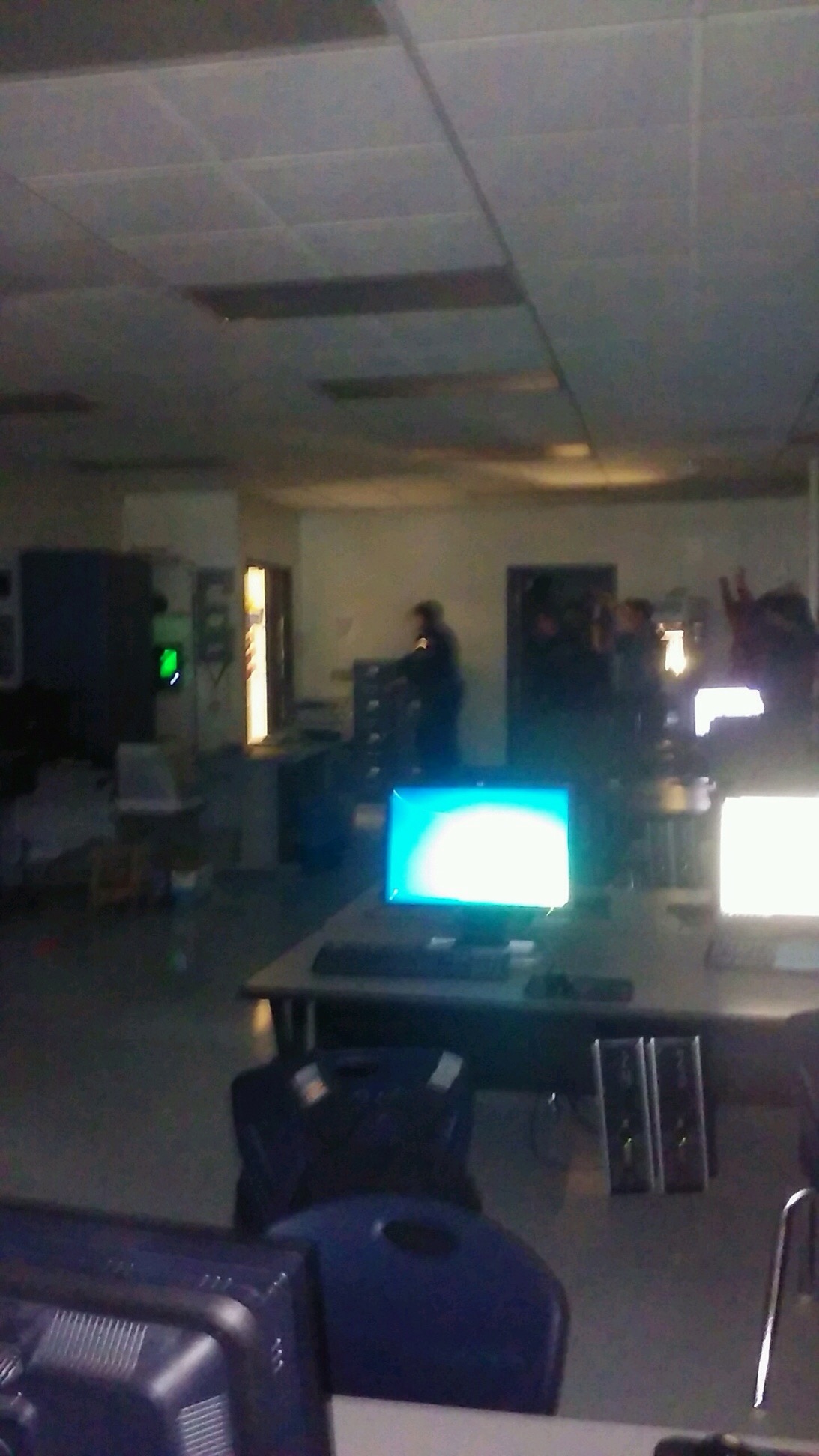
After verifying the security of the room, the officers had the students exit with hands in the air.
Another son was in the gym. They had no windows and weren’t sure at first if there was a real threat or if the school was running a drill. The instructor knew. My son told me about the mood in the classroom.
There was one kid, a sophomore, who had this fighting stance the entire two hours were were in lockdown. When the police came through the door, he almost attacked them, thinking they were the shooter. There was a senior standing next to him that stopped him.
My other two kids were in a building away from the main school building. Their classroom was locked down and police patrolled the halls. The police didn’t think the shooter had left the main building so they were content to leave the kids in the classrooms and guard the doors. The teacher explained that if anyone had to use the restroom, the police would first need to search them before they would be allowed out of the classroom. Two hours is a long time. Eventually, a student appoached the officer at the door.
Where are you going?
I need to use the restroom.
Go behind the piano and pee in a bucket.
Ha ha. . .wait, you’re serious?
Yes.
Apparently the kid didn’t need to go that badly. Eventually every classroom had been checked. Dogs went through the hallways checking for explosives. And eventually, parents were allowed to get their children.
When I arrived in our town on my way home from work, there were still police vehicles lining the street in front of the high school, although the road had been reopened.
The scare was over, but many people’s nerves were still on edge. It turns out that a student was late for class and when confronted about it, decided to make up the story of a man in a trenchcoat with a pistol. The vice principle reported it to the school resource officer who alerted the local police department. The police insist that the recent tragedy in California had nothing to do with the scope of their response. I have my doubts.
It was telling that the reaction of parents and the rest of the public was worry and concern, but none of us thought, “It can’t happen here.” It can happen here. It can happenanywhere. Sadly it’s the world we live in.
Thanks to Pleasant Grove Police Department for the updates they issued throughout the incident. Thanks to all the law enforcment officers who rushed toward the danger to protect our kids. A grateful community appreciates you.
(All photos credit: Isaac Bliss)
Rodney M Bliss is an author, columnist and IT Consultant. His blog updates every weekday at 7:00 AM Mountain Time. He lives in Pleasant Grove, UT with his lovely wife, thirteen children and grandchildren.
Follow him on
Twitter (@rodneymbliss)
Facebook (www.facebook.com/rbliss)
LinkedIn (www.LinkedIn.com/in/rbliss)
or email him at rbliss at msn dot com(c) 2015 Rodney M Bliss, all rights reserved


